

Getting a Yacht Job - The Recruitment Process
The yachting industry is a notoriously difficult industry to get into; the old phrase ‘it’s who you know, not what you know’ springs to mind!
So how do you go about giving yourself the best possible chance of securing yourself that dream job aboard a yacht or superyacht? Our step-by-step guide is designed to help you understand the recruitment process - to help newbies to get their foot in the door and existing crew to find new and exciting roles within the industry.
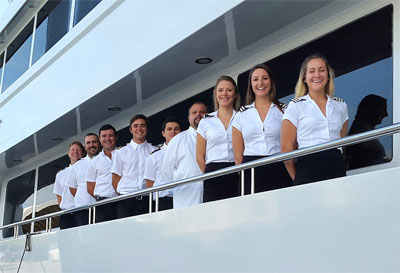
Step 1 - Research
Are you cut out for the lifestyle.
Really think about whether you would suit working on a superyacht – not everyone is cut out for this lifestyle! As luxurious as it may sound, there's a lot of hard work to be done, both physically and mentally.
You’re often dealing with very wealthy and powerful owners, their families, and all their guests. The hours are typically very long and at the same time, you’re sleeping in shared cabins, away from home for extended periods of time, and personal privacy becomes a rarity – and you have to be able to handle all of this whilst maintaining the highest of spirits.
What are the job roles?
You will also need to understand the different job roles. The term ‘yacht crew’ refers to many different roles on board a superyacht; some are more hospitality-focused, such as a steward or stewardess, while others more skill-based, such as an engineer. Whilst you may be planning to enter the industry as a deckhand and work your way up, it’s important to understand the roles, duties, and responsibilities of all crew on board. See the different crew roles explained here .
Step 2 – Prepare
Make sure you have the right training.
There are numerous crew training providers within the superyacht sector and a range of courses and certifications – some of which are mandatory, such as some STCW certificates , while others will simply help you obtain a more desirable set of skills.
Having additional skills (such as another language) and your interests listed on your CV is a huge help in making you stand out from other applicants, so consider which, if any, additional courses you may want complete to help you in obtaining and succeeding in your chosen role before you actively start looking for work.
Get your CV sorted
First things first, you must make sure that you have an up-to-date and professional CV before you can get out there.
Step 3 – Get out there
Yachting hot spots and dock walking.
There are several ways to find work in the yachting world. It is highly recommended to move to the yachting hubs and hiring ports of the world (as crew jobs can come up at any time) and networking in the local yachtie hangouts to get yourself noticed. Different yachting hotspots have their peak periods. You can then be in the right place at the right time to hand deliver your CV to potential employers.
Dock walking is a good way of getting a job, mainly on small yachts. The usual way to obtain crew work is literally to walk the docks and marinas, visit crew agencies and even frequent pubs/cafés used by existing crew.
It is important to dress appropriately, as you are selling yourself. Make sure that you 'look the part' as first impressions count i.e. smart, wearing deck-shoes and a smart shirt (a yacht shirt if you have one).
Almost all crew begin their careers by first doing day work: single, one-off jobs which offer cash and valuable experience. Day work is casual work given by the half day or full day but can stretch into several weeks as the work requires.
It is actually the perfect way to trial different sizes and styles of yacht, to see first-hand how the crew dynamics work and to get a real feel of the work required before committing to a contract.
Of course, casual day work is highly sought after, so it is best to promote yourself as ready, willing and able for work by networking and making contacts and being in the vicinity of the yachts to be able to start work as soon as it becomes available.
Step 4 - Apply and interview
Online opportunities.
Of course, you will find a huge selection of luxury yacht crew positions advertised online. Make sure you register with a specialised super yacht recruitment job-board , such as Yacrew, and upload your CV so that you can easily apply for all suitable positions advertised there. Captains who are looking for crew use these sites to view CVs of suitable candidates.
Attend a job fair
You should also consider attending a specialised recruitment fair. The Cruise Job Fair taking place in London every year is the largest recruitment event within the cruise sector but there are always several recruitment agencies attending who are looking specifically for quality candidates for superyachts.
The advantage of attending an event like this is that you get to meet the recruiters face-to-face, hand over and discuss your CV, get valuable advice and immediate feedback.
Some training centres attend the job fair; they are able to give you valuable advice and help you on your way to getting the right training, skills and qualifications.
The interview process
If you are invited to an interview, then your CV has already caught the eye of the captain or whoever is recruiting for the position! It is important that you make a good impression when you meet in person.
Whether you are a newcomer hoping to land your first contract, or you have previous experience, make sure that you are punctual, smart, prepared with copies of your CV, licences, references, and any other documentation and brush up on your yachting terminology. Be confident, make eye contact and offer a firm handshake. Be clear about your objectives and your career path in the industry, what you will be able to offer as a crew member why you are a good fit for the job.
Of course this will not just be about assessing your skills and abilities, a large part of it will be about your personality and character and whether you will be a good ‘fit’ with the rest of the team on board.
Step 5 – Set Sail
Get on board.
If you are successful at interview, then you will receive a formal job offer to join the yacht.
Good luck and enjoy your time at sea!
Make sure you network as much as possible during the season – as there is a lot of "it’s who you know, not what you know" – and you never know when the next opportunity may present itself!
Career Advice:
Email address:
Remember me Forgotten password?
Password Reset
Enter your email address and we will email you a password reset link.
Email address:
Working On Yachts
There are currently over 15,000 yachts in the world large enough to require professional, qualified yacht crew and as a result this industry is growing rapidly each year.
A career in yachting can be rewarding, exciting and a wonderful opportunity to travel the world and explore new horizons!
Wherever there is water, you have the potential to go. Traditionally the yachting industry in the Mediterranean runs from April until September and from November to April in the States & Caribbean. Having said that, the possibilities are endless with many yachts circumnavigating the world.
Yachting is an eye opening, ultimately fun industry that demands hard work, perfection and attention to detail. We work with yacht crew every day and have a deep insight into what new crew should do to make the most of their career. Here are our top ten tips for starting out.
You cannot work on board a luxury yacht without getting your basic qualifications first. Bluewater offers a full range of crew training courses for those just starting in the industry:
- STCW 95 Basic Training (Europe) 5 Day Course
- Powerboat Level II 2 Day Course
- Interior Introduction 3 Day Course
- AEC 1 5 Day Course
We have a sample copy and lots of relevant advice on creating your first yachting CV within our 'Your CV' section.
Certain times of year are more favourable for new crew looking to join the industry. If you are going to Antibes or Palma, we advise end of March/April. Fort Lauderdale is different in that it is sunny most of the year, however there is a peak recruitment season around November each year.
In every yachting hub you will find english speaking bars and cafes filled with yacht crew. Make sure you go and explore to build your network within yachting. Although global, it is a small industry so make sure to present yourself professionally.
Finding your first position in yachting is the hardest. Make sure you are dock walking, looking for day work opportunities and handing out your CV. You may find that one day's work leads to a permanent role or other job interviews.
Read websites, follow yachting news, learn from other crew who were in your 'deck shoes' a few years ago. Good examples of yachting websites & magazines are:
- Bluewater bluewateryachting.com
- Dockwalk dockwalk.com
- The Crew Report thecrewreport.com
- The Triton thetriton.com
Apply for jobs, manage your course bookings and sign up for events.
You can buy pay as you go SIM cards either in newsagents or specialised telephone shops around the Mediterranean. This will help to save you money when job hunting!
Captains check Facebook and Twitter pages before interviews. Make sure any public images of you are professional and will not reduce your chances of employment. Once employed be sure to avoid any posts about your yachts, current location and inappropriate images.
A smart, professional appearance will win over shorts and a beach top.
The most important aspect when you are looking for work is to make sure your CV is up to date, well written and includes any relevant experience that you might have.
It is best to emphasize any hospitality experience or customer service skills you may have had, such as waitressing, hostessing, silver service, bartending, cooking, nanny/au-pairing, babysitting, flower arranging, cleaning and/or laundry experience.
Should you wish to join the engineering department, make sure you include all mechanical experience and qualifications, including all work done in refrigeration, air conditioning, work with engines, and any electrical work, electronics or AV/IT.
The most important aspect to include is any recreational sailing experience you may have had. If you are also qualified or experienced in woodwork or carpentry, have painting, polishing, varnishing know-how, then that is also great. In addition any diving, sailing, fishing, any water sports background are all fantastic skills that are easily transferable.
We deal with a great multitude of chef positions, ranging from crew chef to head chef. Most positions will require some form of culinary training, however some crew succeed in entering this department through the stew/cook route on a smaller yacht.
When filling in your online profile with us, make sure to only select positions that you are qualified to do onboard. Selecting more than 3-4 positions on your profile can confuse potential employers and effect our search results.
Your CV should be no more than two sides of A4, including your photograph (in colour, face on, without sunglasses).
Your CV should be in a word format to ensure it can be opened easily by all employers.
List all recent contact information, references and work history.
Including a personal statement, along with a clear objective can help distinguish you from other candidates and helps prospective employers grasp your long term goals.
Don't give employers an excuse to dismiss your CV, review and spell check it!
Salary Guidelines

Knowledge is power and the more you research, the more informed & on the ball you will be.
Make sure you have a printed copy of your CV with you and always arrive early and dressed in a smart way. Research the yacht, make yourself prepared & don't be afraid to ask questions.
The key to getting your first job is to network! Always carry a copy of your CV with you.
Remember the industry is a tight, professional network therefore it is crucial to communicate with others, walk the docks, distribute your CV and register with crew agencies. Bluewater is one of the longest-established crew agents - we have been finding people yacht jobs since 1991!
Keep the agencies up to date! Always make sure your profile has the correct location and contact numbers for you so we can get hold of you when we have the perfect role for you.
Your profile is essential to us finding you work, both now and in the future. We rely on the information you input to match you to the right jobs, so please make sure it is up to date and at least 85% complete. We receive thousands of vacancies each year, and search our database for the best candidates for each one... You will hear from us more often if you are checking in regularly! Once you find work you can set your profile to 'Not Available'.
- EXPLORE Random Article
How to Work on a Yacht
Last Updated: June 4, 2023 References
This article was co-authored by wikiHow Staff . Our trained team of editors and researchers validate articles for accuracy and comprehensiveness. wikiHow's Content Management Team carefully monitors the work from our editorial staff to ensure that each article is backed by trusted research and meets our high quality standards. There are 8 references cited in this article, which can be found at the bottom of the page. This article has been viewed 3,264 times.
Working on a yacht is a unique, fun, and potentially lucrative way to earn a living. While it can be intimidating and challenging to get a job on a yacht, having the opportunity to work while traveling can make it well worth it. To begin working on a yacht, you can get an entry-level job that requires little to no prior yachting experience. Once you are more experienced in the yacht business, you will be able to work on a yacht in a more advanced and specialized role.
Getting an Entry-Level Job on a Yacht

- Junior deckhands generally have a good work ethic, positive attitude, ability to learn on the job and follow directions, a professional appearance, and work well with a team. [2] X Research source
- Junior deckhands are responsible for cleaning, polishing, and waxing the yacht, assisting the bosun and first mate with maintenance, and helping with general yacht operations, including line handling, navigation, passenger safety, and water sports. [3] X Research source
- Junior deckhands make approximately $27,000 per year. [4] X Research source

- While not always a requirement, having a watersports certification, fishing knowledge or expertise, and/or carpentry skills can help you get a job as a deckhand on a yacht. Having one or more of these skills may also help you earn more money. [7] X Research source
- Much of a deckhand’s work is performed on the outside of the boat. Therefore, as a deckhand, you would be doing a lot of manual labor outside. This can be helpful to keep in mind when deciding if working as a deckhand is right for you.
- Deckhands usually make between $27,000 and $55,000 per year.

- Boat attendants are responsible for maintaining the cleanliness of the ship’s interior, helping with guest management and entertainment, and assisting the crew in maintaining the safety of everyone on board. [9] X Research source
- Successful boat attendants are high-energy and good entertainers, exhibit proper hospitality etiquette while on the job, and are committed to maintaining yacht cleanliness. [10] X Research source
- Entry-level ship attendants usually make around $40,000 per year, while more experienced workers can make up to $100,000 per year on a large luxury yacht. [11] X Research source

- One of the keys to working as a chef on board a yacht is the ability to get creative with your ingredients. Once you leave the dock, you will likely only have access to the ingredients that you have on hand.
- When considering working as a chef on a yacht, it can be helpful to take into consideration the size of the yacht, the number of people typically on board, and the conditions in the kitchen. As the chef, you will be responsible for making most (if not all) the food for everyone on board, meaning that you may be spending most of your time in the kitchen.
- If you have experience or professional training as a chef, you can make between $52,000 and $100,000 per year on a yacht, depending on your level of training and the size of the yacht. If you do not have any prior experience, you can make between $36,000 and $75,000 per year as a chef on a yacht. [12] X Research source

- Crewnetwork.com and luxyachts.com are both popular yacht crew online agencies.

- If you are working on a yacht abroad, you may need to acquire a work visa. Contact your yachting company or owner to see if this applies.
Working in an Advanced Position

- Bosuns often have a specific area of expertise that helps them land the job and makes them a more valuable member of the crew, such as advanced woodworking, varnishing, rigging, or watersport expertise.
- Bosuns generally make between $36,000 and $100,000 per year.

- On smaller yachts, there is usually just one mate, called the first mate. On larger yachts, however, there may also be a second mate and, possibly, even a third mate. The second and third mates also have extensive experience, yet generally a bit less than the first mate.
- In the event of an emergency, or if the captain needs to take a leave, the mate is responsible for taking over the captain’s duties. As a result, mates need to have any required licenses or certifications for their specific type of yacht.
- Mates on a yacht typically make at least $48,000 and up to $100,000 per year. [14] X Research source

- Yacht captains must have a high school diploma or GED.
- To be a yacht captain, you will need to take a captain’s license course and pass the licensing exam.
- The captain of a yacht typically makes a minimum of $65,000 per year. Captains can make well over $200,000 per year working on a larger yacht. [16] X Research source

- Most engineering positions are available on larger yachts called superyachts. While smaller yachts will hire a yachting engineer for maintenance, they do not usually have a permanent engineer that works on-board. [18] X Research source
Expert Q&A
- Larger luxury yachts may also hire beauticians, pursers, and/or managers to provide luxury services to their clientele. [19] X Research source Thanks Helpful 0 Not Helpful 0
- You can find job postings for positions on yachts on general job search engines, such as Indeed and ZipRecruiter, as well as specialized yachting job search engines, such as yotspot.com and yaCrew.com. Thanks Helpful 0 Not Helpful 0
- When looking for a job on a yacht, it can be helpful for you to already have completed your Standards of Training, Certification, and Watchkeeping (STCW) certification course. This certification is not always required to work on a yacht, but it can help make you a more desirable candidate. Thanks Helpful 0 Not Helpful 0
You Might Also Like

- ↑ https://www.luxyachts.com/crewpositions/jrdeckhand
- ↑ https://www.luxyachts.com/crewpositions/deckhand
- ↑ http://www.workonayacht.com/index.php/official-yacht-stewardess-job-descriptions-salaries/
- ↑ https://www.crewfinders.com/yachtcrewsalaries.shtml
- ↑ https://www.luxyachts.com/crewpositions/mate
- ↑ https://www.luxyachts.com/crewpositions/captain
- ↑ https://www.crewnetwork.com/Yachting-Jobs/engineer.aspx
- ↑ https://whereintheworldisnina.com/working-on-superyachts/
About this article

Did this article help you?

- About wikiHow
- Terms of Use
- Privacy Policy
- Do Not Sell or Share My Info
- Not Selling Info
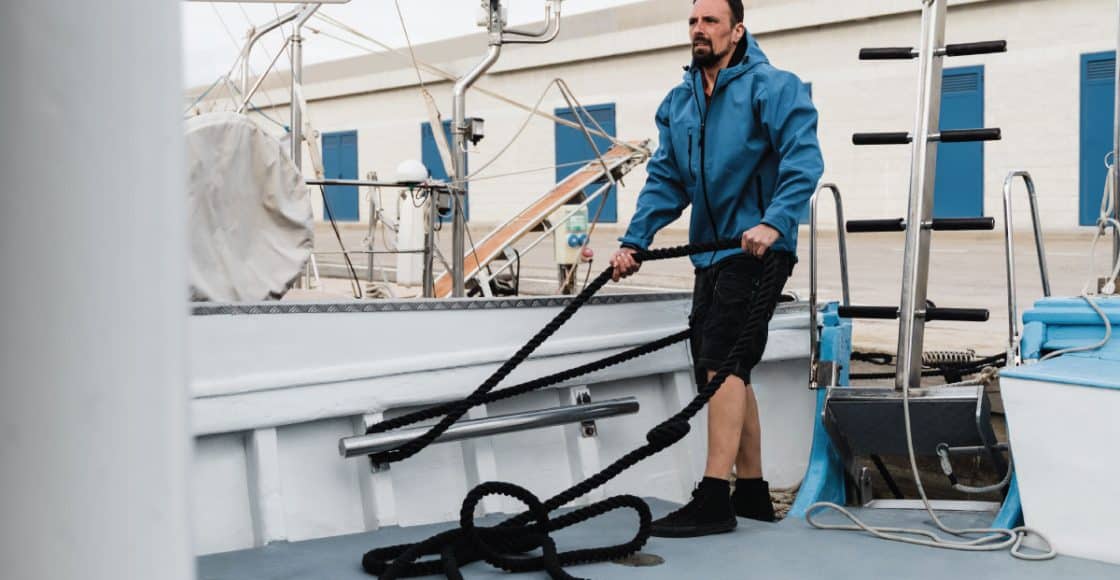
How to Work on a Yacht

Table of Contents
Last Updated on January 10, 2023 by Boatsetter Team
Working on a yacht is honest and good work; it also comes with many amazing perks:
- A one-of-a-kind workspace
- The ability to make industry connections
- Opportunities to move up
Ultimately, how to work on a yacht involves tremendous dedication, along with a little luck. We can set you on the right path here and now.
Browse for yachts for rent on Boatsetter

1. Do your homework
Just as you had required reading while in school, work on a yacht requires understanding a lot of information about deck duties. A few books and websites can (pardon the pun) steer you in the right direction.
The Insiders’ Guide to Becoming a Yacht Stewardess and its companion website workonayacht.com are both by Julie Perry, a stewardess-turned-yacht-marketing consultant. Also check out crew -centric magazines like Dockwalk and newspapers like The Triton , along with their related websites.
2. Get your CV in order
A CV—curriculum vitae—is your resume and should summarize all relevant experience plus transferrable skills. Perry says if you grew up waterskiing or boating, be sure to mention how long you’ve been doing it. Transferrable skills, meanwhile, range from house painting to woodworking and even being a nanny to waiting tables.
Work on a yacht can and does involve maintenance skills and hospitality skills. “You really need to sell yourself on paper, or you won’t stand out,” she says!
3. Go where the yachts are
Fort Lauderdale is the Yachting Capital of the World due to the large yachts that frequent its waters and yachting businesses headquartered there. Fort Lauderdale is also the number-one location for proper training (more on that below) and housing while you job hunt.

4. Find a trainer
How to work on a yacht begins and ends with training. Everyone, whether you want to be a deckhand, a chef, or a steward/stewardess, needs STCW training at a minimum. STCW ( Standards of Training and Certification of Watchkeeping ) is internationally required for every seafarer, in fact.
Briefly, it certifies that you have a basic understanding of safety hazards at sea and can respond properly in emergencies. Bluewater and Savvy Maritime Academy are two well-respected training providers in Fort Lauderdale. Additionally, you need an ENG1 medical certificate, proving you’re fit to work at sea.
Obtain this before enrolling in training in case a medical condition could preclude you from working onboard . Find doctors who provide the exams and certificates on yachting-pages.com , a valuable resource for captains, crew, and the industry.
5. Go beyond the basics
“It’s going to make such a difference in your understanding of the industry and your confidence level,” Perry says, plus increase your chances of landing a job. She adds that most yachts and crew-placement agencies require a certificate of proficiency in security, for example.
If you want to be a deckhand, she continues, consider obtaining a tender-driving certificate. Stewards and stewardesses often enroll in wine and bartending courses, meanwhile.

6. Save money for costs
Perry strongly advises having $6,000 to $7,000 to cover at least two months’ worth of expenses in Fort Lauderdale. These include not just housing (which you can find on yachting-pages.com) but also training, transportation, and meals.
A five-day STCW basic course costs over $1,000, and an additional one-day proficiency in security course is $300.
7. Networking is key
Once you get your STCW, “it’s networking, networking, networking,” Perry says. Online bulletin boards like daywork123.com post new opportunities daily—which can go quickly, so check and register early. Another source, meridiango.com , lets you register, upload your CV, and record a video, then interview via their portal.
Training schools often lend a hand with job hunting, too. Old-fashioned dockwalking—literally walking the marinas—can land you a job as well, as can frequenting places where crewmembers hang out at night.
8. Know the rules
How work on a yacht involves adhering to strict rules about not just safety but also privacy. The larger the yacht, the more the owners and guests prioritize discretion. “If you think you’re going to be a social-media influencer while traveling around on a 200-footer in St. Tropez, forget about it,” Perry warns. Some yachts don’t permit posting pictures or details about the yacht and their movements on social media.
About Boatsetter
Boatsetter is a unique boat-sharing platform that gives everyone — whether you own a boat or you’re just renting — the chance to experience life on the water. You can list a boat , book a boat , or make money as a captain .
Put your boat to work— Start earning an avg. of $20K yearly with Boatsetter

A journalist with more than 30 years’ experience, Diane M. Byrne is the owner of MegayachtNews.com, a daily website educating American superyacht owners, buyers, and their circles of influence about the leading builders, designers, cruising destinations, and more. She founded the website in 2007 as the first, and still the only, American-focused online media outlet exclusively covering this market. It features all-original content, for real stories of real interest.
Diane is additionally one of the most-sought-after journalists for expert editorial coverage and commentary about not only superyachts, but also general boating and yachting. Her byline appears in Boatsetter.com, DiscoverBoating.com, and the magazines Luxury Guide, Ocean, Yachting, and Yachts International.
Additionally, Diane is the Chair of the U.S. Superyacht Association, having been on the Board of Directors since 2015. Outside of yachting, she’s a trustee of Sempre Avanti, a non-profit resource supporting Italian and Italian-American individuals, businesses, and organizations in the United States and Italy.
Browse by experience

Explore articles

6 Best Lakes Near Atlanta, GA
3 Biggest Reasons Boatsetter Owners Download The Owner App

10 Hidden Summer Destinations to Discover by Boat

How to Drive a Jet Ski

Start a Superyachting Career
Start working on a superyacht by completing the following steps:.
- Have realistic expectations
- Select a superyacht job department
- Complete superyacht training courses
- Obtain an ENG1 medical certificate
- Select a location to join the industry
- Obtain visas & documentation
- Create a superyacht CV
- Find superyacht job vacancies

1. Have Realistic Expectations

- The superyacht industry is highly competitive and in order to qualify for employment a financial investment is required (training & travel)
- For applicants without relevant experience, being physically present at or near Superyachting hubs when searching for employment is important
- Obtaining the correct qualifications does not guarantee employment and training is not refunded
- Your passport and ability to obtain Visas have an impact on your employability
- Having contacts, experience, and the correct attitude is an advantage
- Working in the industry comes with some amazing benefits but like any career path, there are also disadvantages
- Being an extremely "hard worker" is not an advantage, it is expected
- The quality of work and attention to detail needs to be of a very high standard
- You need to be well-mannered, professional, and well-suited to living in close proximity to other crew
- Presentation matters
- Getting advice from multiple sources including crew who work in the industry is advised
- Different yachts, owners, crew, and itineraries = different experiences
2. Choose the Yacht Crew Department you Wish to Work in
Before joining the yachting industry, it is essential to decide on your career path. The work environment and duties associated with each superyacht department vary greatly. It is therefore advised that you understand the training, duties and requirements associated with each role. The most common roles for crew entering the industry are:

Steward / Stewardess
A superyacht stewardess is responsible for the guest service, housekeeping and laundry. In some cases, the position is combined with an additional role for those who come from a beauty or healthcare background.

Superyacht Deckhand
A deckhand is responsible for the cleanliness and upkeep of the yacht's exterior. Wash downs, line handling, tender driving, watersports and bridge lookout duties are common tasks for deck crew.

Superyacht Chef
Working as a superyacht chef comes with some unique challenges. Although the skills are certainly transferable, there is specific training and certification required. It can be a tough but extremely rewarding job.

Superyacht Engineer
Working on a yacht or superyacht as an engineer can be a rewarding career path. Although a background in engineering or mechanics is an advantage, it is not a prerequisite. The duties associated with the role are diverse, exciting and require a great deal of hard work.
3. Complete All Mandatory Superyacht Training Courses
Having the correct training and certifications is essential to your employability in the superyacht industry. In order to become a crew member, you will need to have completed the following training:
- STCW 2010 Basic training
- Proficiency in Designated Security Awareness or Proficiency in Designated Security Duties
- Department-specific training for your desired role. (I.e. stewardess, deckhand, engineer, chef, and officer courses)
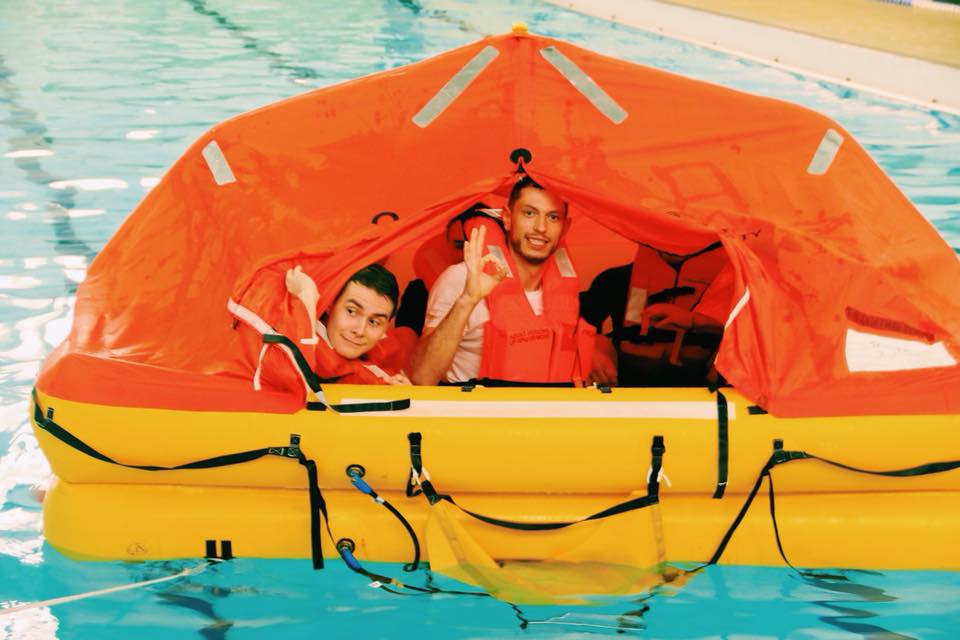
4. Obtain an ENG1 or ENG1 Equivalent Seafarer Medical Certificate

ENG1 Medical Certificate (or ENG1 Equivalent)
Superyacht work can be physically demanding. Ensuring that crew are physically well and able to work at sea is a crucial aspect of the crew and guest safety.
In order to work on a superyacht, you will have to hold an ENG1 Medical Certificate. Because the certification is set by the Maritime and Coastguard Agency (MCA), the examination must be performed by an MCA-approved doctor. The examination is done in order to identify any medical conditions that may prevent you from safely performing your work duties at sea.
5. Choose a Location to Join a Superyacht
When looking for your first job it is essential to be in the right place at the right time. There are a lot of factors to take into consideration when selecting your location, however the two most popular areas for working on a superyacht are:
6. Obtain the Correct Visas & Documentation for the Relevant Superyacht Hub
It is essential to obtain the correct visa for the country you plan to work in. It is important to understand the types of visas that exist as well as the local laws with regard to job seeking.

7. Create a Superyacht Crew CV
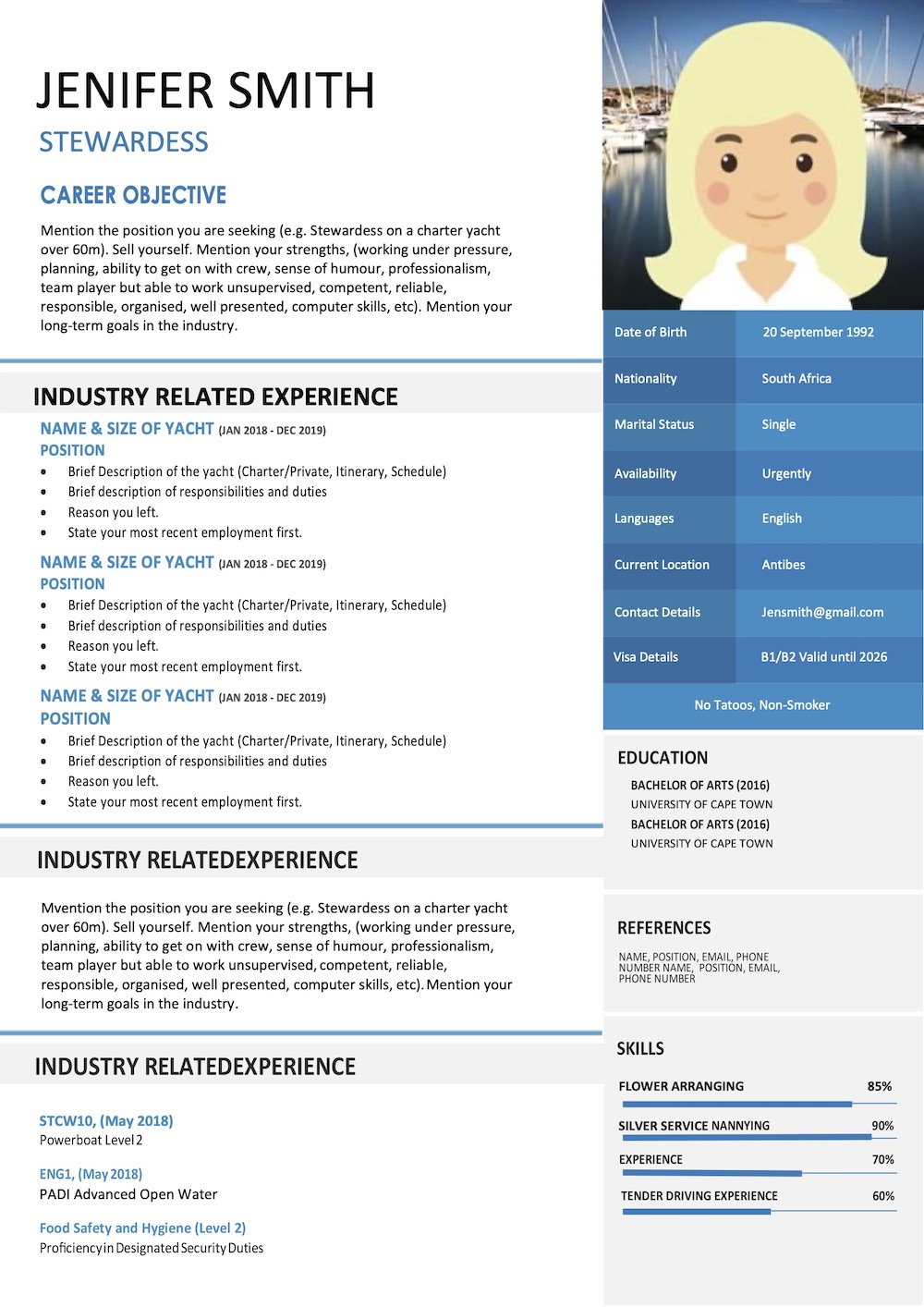
A professional and well-structured superyacht CV will help differentiate you from other job seekers looking to enter the industry.
Superyacht crew resumes have a different structure to normal CVs. If your CV is not laid out appropriately, your chances of being considered for a position are slim.
Examples and more information on how to create a great CV can be found on the links below.
8. Find Superyacht Job Vacancies
Finding the right job in the superyacht industry takes time and commitment. Using credible resources is key:
- The My Crew Kit Superyacht Job Board - Crew Agencies - Social Media Pages - Dockwalking - Networking

My Crew Kit Job Board:
My Crew Kit has the fastest-growing job board in the industry. Find the latest jobs posted by crew agents, captains and crew around the world!
View the latest vacancies
Crew Agencies
Crew Agencies play an intermediary role between yachts and crew. There are numerous agencies scattered around the main yachting hubs. Registering is a simple process and can be done online, many agencies will then request a short interview in person.
Find out more about Crew Agencies

Social Media Pages:
Online job boards and social media pages are extremely useful ways to apply for jobs as well as to find day work. It is important to only apply to jobs if you meet the criteria (have the correct experience and qualifications).
Be wary of which jobs you apply to. We recommend you only apply for jobs from closed social media groups with active moderators. Fake job posts do occur at times. Make sure you do not meet with or send personal information to suspicious accounts.
Find Appropriate Social Media Pages
Dockwalking:
Dockwalking is the process whereby you walk the docks with the aim of getting day work or even landing a permanent job. It is a gruelling task as there are often long distances between docks and it requires hours on foot. It also involves a lot of rejection as many boats are fully crewed and not looking for employees.
Find out more about dock walking.
Networking:
Your introduction to the world of yachting. The industry is growing exponentially; every year more boats are built, and more crew join the industry. It remains however, a close-knit community that feels a lot smaller than it is. ‘Everybody knows everybody’ and finding a job through a friend or a friend of a friend is often the best way to go. Crew like to work with people they get along with. They are therefore much more likely to hire someone from their extended network of friends than to look elsewhere (provided experience and qualification requirements are met).
A Few Suggestions:
- Network at every opportunity you get.
- Socialise with people you meet at training courses.
- Attend dock parties and BBQs.
- Socialise with the people in your crew house and visit other crew houses.
- Join yacht groups on social media.
- Hang out in the ‘yachty’ bars and restaurants.
- The more people you know in the industry the better off you will be.
Username or Email Address *
Remember me Lost your password?
Username or Email
Get New Password
Work on a Yacht Guide
Have you ever dreamt of sailing the open seas, exploring exotic destinations and living a life of luxury? Working on a yacht might just be the perfect career path for you. We take you through the steps of how to get a job on a yacht, provide useful tips and advice, answer frequently asked questions, and explain why UKSA is your best choice to start your yachting career .
How to Get into Yachting
If you’re passionate about the ocean and have a desire to work on a yacht, here’s a step-by-step guide to help you enter the yachting industry:
Step 1: Research and Gain Knowledge
Begin by familiarising yourself with the yachting industry. Learn about the different types of yachts, the roles available on board, and the lifestyle associated with working on a yacht. Read books, articles, and blogs written by experienced yachties to gain insights into the industry.
Step 2: Obtain the Necessary Qualifications
To work on a yacht, certain qualifications and certifications are required. The most essential certification is the STCW (Standards of Training, Certification, and Watchkeeping) certificate, which includes basic safety training. Additionally, specialised courses such as yacht crew training, deckhand training, or culinary training can significantly enhance your chances of securing a job on a yacht.
Step 3: Gain Practical Experience
Building practical experience is crucial to increasing your employability in the yachting industry. Consider volunteering or interning at local marinas, yacht clubs, or boat shows to gain hands-on experience and learn more about the day-to-day operations on a yacht.
Step 4: Create a Yachting CV
Craft a professional and tailored CV specifically for yachting positions. Highlight any relevant experience, qualifications, certifications, and skills that showcase your suitability for a yacht job. Pay attention to details such as including a professional headshot, references, and a concise summary of your skills and abilities.
Step 5: Network within the Yachting Community
Networking plays a vital role in securing a job on a yacht. Attend industry events, join online forums and social media groups dedicated to yachting, and connect with experienced yachties and crew agencies. Networking can open doors to job opportunities and valuable connections within the yachting community.
Step 6: Apply for Yacht Jobs
Utilize online job platforms, crew agencies, and yacht-specific websites to search and apply for yacht jobs. Tailor your applications to each position, highlighting relevant skills and experience. Be persistent and proactive in your job search, as the competition can be fierce in the yachting industry.

Becoming a Yachtie Tips
To increase your chances of success in the yachting industry, here are some helpful tips to consider:
Tip 1: Be Flexible and Adaptable
Working on a yacht requires flexibility and adaptability. Yachts operate in different locations, and schedules can change at short notice. Be prepared to adjust your plans and accommodate the needs of the yacht and its guests.
Tip 2: Develop Excellent Communication Skills
Effective communication is essential when working on a yacht. You will interact with crew members from diverse backgrounds and guests with varying expectations. Polished communication skills, both verbal and written, will contribute to a harmonious working environment.
Tip 3: Maintain a Professional Attitude
Working on a yacht demands professionalism at all times. Show respect to your colleagues, guests, and the yacht itself. Demonstrate a strong work ethic, integrity, and a positive attitude. Being professional and reliable will enhance your reputation within the industry.
Tip 4: Embrace Continuous Learning
Yachting is a dynamic industry that requires continuous learning and skill development. Stay updated with the latest industry trends, regulations, and safety protocols. Pursue further certifications or training programs to broaden your skill set and increase your employability.
Tip 5: Build a Strong Work Ethic
Yacht work can be demanding, requiring long hours and physical exertion. Develop a strong work ethic, be willing to go the extra mile, and demonstrate a proactive approach to your duties. A strong work ethic will set you apart from the competition and contribute to your success in the industry.
Working on a Yacht FAQs
Here are answers to some frequently asked questions about working on a yacht:
Q: What qualifications do you need to work on a yacht?
A: The necessary qualifications vary depending on the role you aspire to fill. The STCW certification is a minimum requirement for all yacht crew members. Additional qualifications such as deckhand training, culinary courses, or engineering certifications may be necessary for specific roles.
Q: How much do you get paid to work on a yacht?
A: Salaries in the yachting industry can vary greatly depending on factors such as the size of the yacht, the level of experience, and the role you hold. Entry-level positions typically start around $2,000 to $3,000 per month, while senior positions and specialized roles can earn significantly higher salaries.
Q: Can I work on a yacht with no experience?
A: While having prior experience in the maritime industry or hospitality can be advantageous, it is possible to get yacht jobs with no experience. Entry-level positions such as deckhand or stewardess roles are often available for individuals willing to learn and work their way up.
Q: What is the best age to work on a yacht?
A: There is no specific age requirement to work on a yacht. Yachts employ individuals of various ages, and it’s more about one’s skills, qualifications, and ability to meet the demands of the job. As long as you meet the necessary requirements and possess the desired skills, age is not a limiting factor.
Why UKSA is Your Best Choice to Start Working on a Yacht
If you’re looking for the best way to kickstart your yachting career, UKSA should be your top choice. As a renowned training centre for the maritime industry, UKSA offers comprehensive courses and training programs tailored to the needs of aspiring yachties. With experienced instructors, state-of-the-art facilities, and a strong network within the yachting community, UKSA provides the perfect platform to launch your career on a yacht.
Contact our team now .
Latest posts

Impartial training and careers advice
Call us: +441983 280 641
+441983 280 641
- How to become a Yachtie
So you’re thinking about becoming a Yachtie?
You may have a friend or relative who already works in the industry, or you have watched TV programmes like Below Deck , you know working on a yacht is the right for you, but where do you start?
With the potential to earn great money, travel, and work with loads of like-minded people, it’s not surprising this job ticks a lot of boxes for many people.
Becoming a Yachtie and getting paid to work on luxury yachts may seem like a job and industry that only the elite can have access to, or it just seems too confusing to start.
However, with an understanding of the requirements, certification, and having some expectations of what job role you should be looking for, starting work as a Yachtie will not seem so daunting.
What is a Yachtie?
Before we go any further, let’s make sure we are all singing off the same hymn sheet.
A Yachtie is a broad term used to describe anyone who works on a yacht. More specifically, it has become the term for people working as yacht crew on superyachts.
A superyacht is a very large boat that is extremely luxurious and often owned by multi millionaires and billionaires.
These Yachties who work on superyachts hold a number of different positions. Most Yachties will start their superyacht career working as a Deckhand or Stewardess. With more experience and responsibilities, your role will change as you progress up the career ladder.
It’s worth noting there are other types of yachting and Yachties. The other kind of ‘Yachtie’ could describe those who hold their Yachtmaster qualification and have jobs like skipper charter boats.
Job roles for new Yachties
Yachties new to the industry (also known as ‘Green’ Yachties) will traditionally apply for entry levels roles, which are Yacht Deckhands or Yacht Stewardesses.
These are both very different jobs, so you need to be sure which one you want to do and start training for that career path.
Yacht Stewardess (Stew)
A Stewardess, or Steward , looks after the interior of the yacht. This means anything that happens inside the boat, you will be responsible for it.
Think of any job in the hospitality industry and then combine it into one role on a yacht, that is what you will be doing.
From making beds, doing the laundry, cleaning, serving food, and hosting dinner, you will do it all to a 5-star standard. Anything less than perfect, and your guests won’t be satisfied.
It’s the small things that make the difference between high standards and exceptional standards. You must have a great eye for detail and be able to make sure no stone is left unturned. Everything on board the ship must be 100% perfect at all times.
You will be reporting to Chief Stew, who will be your manager and give you your task list. After a good few seasons as a green Stewardess, you will have enough experience and confidence to apply for Chief Stewardess roles.
Yacht Deckhand
In contrast to the Stewardess role, Deckhands look after the exterior of the boat.
Predominantly a male role, Deckhands will do everything from general maintenance to cleaning the teak deck, looking after the toys (Jet Skis, etc.), and even driving the tenders.
Deckhands should know how a yacht operates, the basic terminology used onboard, how to tie knots, and loads and loads of enthusiasm.
Deckhands may also dip in and out of helping the Stewardesses, and it isn’t uncommon for Deckhands to give a hand during busy evening meal preparation and service.
5 steps to Becoming a Yachtie
With an understanding of the job roles available, you can now decide which one best suits you. With the right attitude, qualifications, and knowing where to look for work, becoming a Yachtie is achievable for anyone who wants it.
- Have the right attitude
- Pass an ENG1 medical
- Complete STCW Basic Safety Training
- Gain experience
- Go to a superyacht marina
1. Have the right attitude
Along with gaining the correct qualifications to prove your competence, to become a Yachtie, you must have certain characteristics to thrive in this industry.
Yachties have to be well presented, articulate, know how to take orders, and be able to work hard, all with a smile and enthusiasm. You have to be able to work incredibly long hours, sometimes under stressful conditions, without losing your patience.
Having a job on a superyacht may sound glamorous, but if it’s your 10th day working in a row and you’ve got your head stuck down a toilet trying to clean it, you may want to think again. To become a Yachtie, you have to be happy with spending a lot of time away from home without seeing your friends and family. This may all seem obvious, but this situation does not suit everyone, and without careful consideration of the negatives, you will leave this industry quicker than when you arrived.
2. Pass ENG1 Medical
The first actionable step you need to take to become a Yachtie is gaining an ENG1 medical certificate. The ENG1 medical is an examination by an approved MCA (Maritime and Coastguard Agency) Doctor to make sure you are fit and able to work at sea.
Every single person working at sea must have an ENG1 medical certificate , without this, you are not able to start working on superyachts. The examination will take around 45 minutes, during which the doctor will go through a checklist to make sure you have no underlying health conditions that may impact the safety of you or anyone else on board the ship.
The most common reason new yachties fail the ENG1 is colour blindness. Surprisingly many people can go through their whole life without knowing they are colour blind. However, on board a ship, this can have huge implications. If you cannot identify signals and lights correctly, it will be impossible for you to help navigate the ship in an emergency. Unfortunately, this means you cannot start work as a Yachtie.
3. Complete STCW Basic Safety Training
Another requirement for working at sea is completing STCW Basic Safety Training . Similar to the ENG1 you can only get a job on a yacht if you have the STCW certificate.
STCW stands for ‘Standards of Training, Certification and Watchkeeping’. It is to make sure that all Seafarers have an understanding of what to do in an emergency and are aware of the procedures required.
STCW Courses are action-packed and quite a bit of fun. From fire fighting to sea survival, you will get stuck in learning, and learn loads of new skills.
4. Gain experience
If you are lucky enough to have a job offer on a superyacht, then having your ENG1 and STCW certificates will be enough.
Don’t worry if you haven’t already got a job offer, it’s quite normal to go through all these steps and not have a job lined up yet. If this is the case, gaining more experience and qualifications is a good idea to give you a competitive advantage over anyone else applying for the same job role.
This is achieved through signing up to a Deckhand or Stewardess Course. On these courses, you will get your standard STCW certificate and a list of extra qualifications demonstrating your competence, ability, and commitment to the industry.
Deckhands will learn how to drive a small yacht, engine maintenance, general yacht repair, and how to clean teak properly. Stewardesses will understand wine and how to serve it, the art of flower arranging, and how to drive a powerboat.
5. Go to a superyacht marina
After you have completed your superyacht training, now is the time to head out to France and look for work. Along with signing up to yacht crew recruitment agencies, going to one of the main superyacht marinas and handing out your CV to Captains is a great way to find work. This is known as dockwalking.
If you complete your Superyacht Course with us, you will have the option of signing up to our recruitment day in Antibes, France. We head out to France as a group, talk you through the process and offer you our industry contacts.
This is a great way to start your journey, and all our students find work in no time.
How much do Yachties make?
So you’ve heard you can make a good amount of money working on superyachts? Along with the travel, the great salary is why many people decide to become a Yachtie.
Like a job within any industry, salary varies. A Superyacht will agree on a crew salary budget with the owner of the yacht.
If you are just starting out, you can expect a salary of around €2,200 – €3,200 per month. However, the industry standard is €2,500 per month. Once you gain more experience and qualifications, your salary will increase.
When you look at the salary at face value, it looks great but not incredible, however when you are at sea, you have zero outgoings. Working on a yacht means you don’t have to pay rent, bills, or buy food which will save you heaps of money compared with working at home.
If you want to see the salaries of all yacht crew, check out our Salary Guide.
Do Yachties pay taxes?
Another reason why the salary is so appealing is that in most cases Yachties don’t have to pay tax.
This is a government scheme called the Seafarers Earning Deduction , and providing you are eligible, Yachties can keep 100% of their earnings.
To be able to apply for Seafarers Earning Deduction, you must be working on a ship outside of UK waters for a period of 365 days. This doesn’t mean you have to spend a whole year at once away from home, rather you can only apply once all the days you work on a yacht adds up to 365.
Being able to understand this tax scheme will be hugely beneficial before you start working on a Superyacht.
Download our free Guide
Want to know more about working on a Superyacht, please download our free guide .
Related articles
- Seafarers Tax
5 ways to ensure your SED claim is rock solid
The Seafarers’ Earnings Deduction, often referred to as the SED, is a tax legislation that enables seafarers to claim back their UK income tax. It a...
Do I need to pay off my Student loan if I work on a Superyacht?
Good question! First, let me say that the information below is aimed at people who have studied in the UK and took out a Student Loan to cover course ...
Have I got the right experience to work in yachting?
If you’re thinking about working on board a Superyacht, we share the skills and experience you need and how to get into the yachting industry in thi...
How to start your Career in Yachting

Are you looking to change your career and work on a Yacht? Jobs at sea such as deckhand, stewardess or a chef are extremely rewarding and our specialist recruiting team at Viking Crew can help you with some essential tips to make your dream career come true.
Creating your Yachting CV
Your CV is your selling tool. It is the first impression the Captain/Management company will have of you and you will need it to make an impact in such a competitive industry.
• Ensure you include a smart, professional head and shoulders photograph • Double check all contact details are up to date, including a professional email address • Include all relevant work experience, starting with your most recent • Keep an easy to read layout • Include all relevant Qualifications • Include all relevant hobbies and interests including watersports, team sports etc • Provide up to date contact information for x 2 verbal references • Keep CV to a maximum of 2 pages. Make it concise and ensure it sells YOU to the potential employer!
Our yacht placement team are always on hand to assist with enhancing your CV and chances of gaining a suitable role within the industry.
What Training/Certification will I require prior to joining the industry?
To start work in the yachting industry, the main certificates requested by the vessel or management company are usually:
• STCW Basic Training - The aim of the course is to give seafarers the essential education and training in Personal Survival Techniques, Fire Prevention and Fire Fighting, Elementary First Aid and Personal Safety & Social Responsibilities, with an additional Proficiency in Security Awareness • ENG1 or Equivalent Seafarer Medical- This can be completed at any MCA approved doctors' surgery .
We also receive many requests for:
• Proficiency in Designated Security Duties • Powerboat level II
Any additional relevant courses that could benefit yourself or the yacht. These could include, but not limited to:

• VHF Radio • RYA Radar • RYA Competent Crew • RYA Tender Operator • PWC Personal Watercraft Profiency • PWC Personal Watercraft Instructor Course
• Food and Hygiene level II • Silver Service Certification • Floristry Training • Mixology/Barista Training • Wine Knowledge • GUEST Approved Stewardess

Dock Walking
Yachting is a competitive industry to break into. There are large numbers of crew who are keen to gain their first experiences in the industry. Most entry-level crew gain their first experiences by Dock Walking. This is essentially, travelling to “yachting hubs” such as South of France or Palma and walking the dock. This will involve approaching and speaking with the crew (where possible) with the aim of securing some day work or even a permanent position.
How shall I prepare for my yacht Interview?
Yacht interviews will usually be held face to face if nearby the vessel or more commonly, by telephone or video call. We recommend:
• Be on time • Impeccable presentation • Be prepared, try to do some research, where available • Show commitment to the boat • Ensure you get across ALL relevant experience for the role that you are interviewing for but show willingness to learn and expand your knowledge and experience • Listen to the interviewer • Treat all interviews, including virtual, as if they are face to face • Always stay professional • Have any questions prepared prior to interview.

How to apply through Viking Crew?
• You can register with Viking Crew by creating an online profile here • You can apply directly for any roles on our website through your profile • Should you require any further information on the roles available please contact the placement team by phone, or email. • Please make sure you keep all your information up to date in the system so our team is aware of your availability, location, and experience so we can contact you regarding suitable openings.
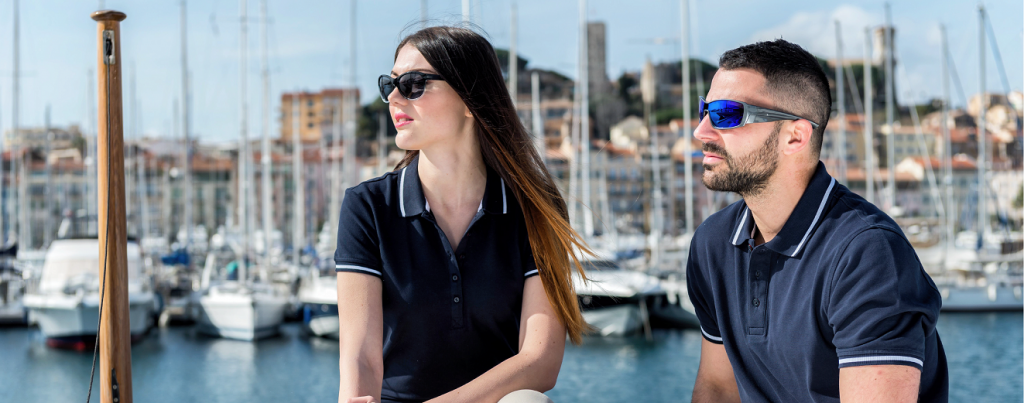

Sign Up For News & Updates
- Terms & Conditions " required=""> I agree to your Terms & Conditions *

- Industry Updates
- General Boating News
- Something Else
- I am happy to receive email updates from Viking Crew
- I agree to your Terms & Conditions
Ready To Apply?
Apply with 1 click with your viking crew account..
Don't have one? Click below to register and complete your profile
Email Address
Remember Me

Register With Viking
Search saved.
Manage your search preferences in your user profile
Thankyou for your message.
We aim to respond to all queries within 24 hours. Still looking for the perfect job? Start a search now
Thank you for signing up, keep an eye on your inbox. Ready to start your job search?
- Our Clients
- Our Offices
- Associations & Accreditations
- Crew Your New Build Yacht Projects
- Yacht Services Overview
- Funding and Grants
- Maritime Labour Convention (MLC)
- Green Crew Pathway
- Mental Health & Wellbeing
- Women in Maritime
- MCA Wellbeing at Sea Tool
- Newsletters

- Frank Magazine
- Denison History
- Virtual Tours
- Alaskan Yachts
- Azimut Yachts
- Back Cove Yachts
- Beneteau Yachts
- Benetti Superyachts
- Bertram Yachts
- Boston Whaler
- Broward Yachts
- Buddy Davis Sportfish
- Burger Yachts
- Cabo Yachts
- Carver Motoryachts
- Center Console
- Chris-Craft Yachts
- Cruisers Yachts
- DeFever Trawlers
- Dufour Sailboats
- Fairline Yachts
- Feadship Yachts
- Ferretti Yachts
- Formula Yachts
- Fountaine Pajot Cats
- Grady-White
- Grand Banks Trawlers
- Hargrave Yachts
- Hatteras Yachts
- Hinckley Picnic Boats
- Horizon Yachts
- Hydra-Sports
- Intrepid Boats
- Jarrett Bay Sportfish
- Jeanneau Yachts
- Kadey-Krogen Trawlers
- Lazzara Yachts
- Luhrs Sportfish
- Marlow Yachts
- Maritimo Yachts
- Marquis Yachts
- McKinna Motoryachts
- Meridian Yachts
- Midnight Express
- Mochi Craft
- Neptunus Motoryachts
- Nordhavn Trawlers
- Nordic Tugs
- Ocean Alexander Yachts
- Offshore Yachts
- Oyster Sailing Yachts
- Pacific Mariner Yachts
- Palmer Johnson Yachts
- Pershing Yachts
- Prestige Yachts
- Princess Yachts
- Pursuit Yachts
- Riva Yachts
- Riviera Yachts
- Sabre Downeast
- San Lorenzo Yachts
- Sea Ray Boats
- SeaVee Central Consoles
- Selene Trawlers
- Scout Yachts
- Sunseeker Yachts
- Tiara Yachts
- Trinity Superyachts
- Viking Yachts
- Westport Yachts
Yacht Crew Jobs: How To Get Hired + Work On A Superyacht

August 7, 2020 4:50 pm
Interested in working on a yacht denison’s lead crew coordinator jill maderia details what aspiring crew professionals need to know before their first job..
Looking for a job that allows you to travel the world? Working as a crew on a superyacht may be a dream for many. Yacht crew are held to the highest standards of professionalism, catering to superyacht owners and guests to create the ultimate yachting experience. Whether you’re interested in becoming a deckhand, stewardess, or chef, we’ll break down how to enter the yachting industry and provide tips on how to prepare for your first yacht crew job.
Q: What courses do I need to complete before working on a yacht?

A: Crew must have the basic safety course called STCW. If they are working on a charter yacht, they will also need the ENG1 (medical clearance). While STCW is the basic course needed, addition courses might set you apart, as it shows commitment to a career on yachts.
For example: The Power Boat class is important to have if you are deckhand, but having this and learning how to drive a tender, would benefit anyone that works on a yacht.
Any extra courses such as hospitably, silver service, mixology are a plus and will help crew better market themselves for opportunities.
Q: After completing my courses, how do I get a job on a yacht?

A: You must have a great CV. Create a portfolio of your work. If you are a Chef or stew, have photos of your food, table settings, flower arrangements. I have had a deckhand show “before and after” projects such as teak work on deck too. Our crew website can create an album of your work.
Plus, showcase your skills. While qualifications are required, your skills that you have might be the reason you get that dream job. Many boats, especially charter yachts, seek out crew with additional skills, whether it be a stew with cooking or childcare experience, or a deckhand that is also a drone operator or photographer.
Q: Do I want to work on a private yacht or a charter yacht?

A: There are benefits to both. There is a difference, as charter boats you will have a combination of owner vs. charter guests. In addition, crew often like the benefit of the additional gratuity at the end of a charter, which can be a range of 15-20%.
Q: What is the interview process like for yacht crew?

Presentation is key: Both with your CV, and in your interview. Your first impression is important, so dress the part as much as you can. Keep in mind, many interviews are via FaceTime or Zoom. Treat virtual interviews the same as you would in-person, show up on time and be professional.
Q: How can networking help my crew career?

Go to crew events, or consider crew housing. You never know where your next job may come from. Maintain relationships with crew agents, other crew members, and industry professionals. It important to be out and meeting people in person or even virtually on Zoom.
Q: Any other tips that will help in landing a yacht crew career?

- 1) Research: Read industry publications. This is especially important for those who have never worked in the hospitality industry. In addition to taking your courses, conduct your own research.
- 2) Crew Housing: When crew stay at a crew house, they have the benefit of networking with other crew. They may even find jobs from crew mates and share ideas and tips in the industry. There are a variety of crew typically, from green to experienced and they all have a story to tell or some wisdom to share.
- 3) Daywork: Sometimes daywork can lead to long term opportunities. While daywork is temporary, crew may not realize that daywork can lead to the Captain or department head interviewing you and seeing how you might fit in with a boat full time.
- 4) Checking in: Check in with your agents. The better your crew agent knows you, the easier it is for them to properly match you to a boat. Keep your crew agent informed on if you’re still looking for work.
Ready to start your career in crew? Contact Lead Crew Coordinator Jill Maderia , or explore all the options Denison Yachting offers in our crew division.
Jill Maderia
- Email: [email protected]
- Cell: 954.600.7058
- Office: +1.954.278.9250
- Show Listings
Latest News

NEWS | May 31, 2024
Monaco f1 grand prix 2024: live from the denison office.
Monaco F1 Grand Prix 2024: Live from the Denison Office The Denison team and guests watched the Formula 1 Grand Prix live from the Denison Monaco office. The Monaco Formula 1 Grand Prix raced past the superyachts docked at Port Hercule on Sunday, May 26, 2024. As has become an

NEWS | May 30, 2024
San diego boat show [new boats on display].
San Diego Boat Show [New Boats On Display] Thursday, June 20 – Sunday June 23, 2024 Denison invites you to view a 53′ Dufour, 52′ Seawind, 41′ Dufour, 39′ Dufour, and 38′ Excess at the San Diego International Boat Show. Whether you’re a seasoned sailor or new to

NEWS | May 29, 2024
Sunreef superstars: influential owners.
Sunreef Superstars: Influential Owners Sunreef Yachts attracts influential owners and ambassadors, including tennis legend Rafael Nadal, Formula 1 superstars Fernando Alonzo and Nico Rosburg, and…Paris Hilton too This article was written by Bill Springer. Photography courtesy of Sunreef Yachts. After interviewing lots of the

Get Onboard
Superyacht Training

How to Work on a Superyacht, with no Experience
Working in the superyacht industry looks like the dream job, right? But, how do you get started with no work experience? With over 12 years in the industry, interviewing and hiring countless candidates across various positions, we know first hand what information you require to get your first real crew job on a superyacht. In this post we highlight some of the features of our “Beginners Guide to Yachting” Ebook which explains all you need to know from how to get your CV yacht perfect, typical daily stewardess or deckhand duties, how to find day wo rk, and more.
What kinds of entry level positions could I apply for?
The two most common entry level positions on yachts are stewardess and deckhand jobs. These are both junior ranks whose primary concern is to keep the guests happy and ensure the interior and exterior are kept immaculately clean.
What previous experience is useful when looking for a job on a yacht?
While working on a yacht is certainly different to any land-based career, there are a few land-based jobs that would have equipped you with skills useful on a vessel. Jobs that may be useful include:
- Hospitality-related jobs
- Waiting tables in a high-end restaurant
- Child care or au pairing
- Carpentry
- Sports or diving instructor
If you have already completed some form or degree or diploma in engineering or mechanics, this is also considered a huge plus.
Are there specific qualifications I need?
Yes. You will need an STCW 10 certificate to understand basic safety protocols, as well as an ENG1 Medical Certificate to prove that your health is in good enough shape to join a vessel. Get Onboard Superyacht Academy offers complete STCW and ENG1 training in Cape Town, South Africa. These are the only compulsory documents needed, but if you are interested in a specific role, we offer specialised courses to equip you for these.
How do I get my first job on a yacht?
Once you are qualified, follow these steps:
- Construct a CV. Be sure to include all relevant information and documents, as well as a friendly, yet professional photo of yourself. Download our free template for a starting point.
- Pick a location to start. Antibes in France, Palma de Mallorca in Spain, and Fort Lauderdale in Florida are great places to start out as a newbie.
- Find some day work. This is work outside of a formal contract, which may involve helping out for a day to several weeks. Day work is an excellent opportunity to network, build contacts in the industry, and get a foot in on your journey to securing a more permanent job.
How much money do you make working on a yacht?
The standard entry level salary for a junior stewardess or deckhand ranges between €2,000 – €2,500 or $2,300 – $2,800 per month. This amount is generally tax free, although the onus is on each crew member to check with their home county about tax obligations. Certain countries are tax exempt, provided you spend more than six months out of the county.
Check out our salary guidelines for more information. Still have questions? Get in touch with us , we’d love to help you navigate the seas of yachting!
Needing more?
Error: Contact form not found.
RYA/MCA Online
1. what are the basic requirements you need to be eligible to work in the yachting industry, 2. what is the stcw and why do i need it, 3. what is the eng1 medical certificate, 4. what land based experience will help me find a super yacht job, 5. what are the different departments onboard, 6. what crew training is required for me to work as a junior deckhand.
- Yachtmaster/Coastal Skipper Theory
- Yachtmaster/Coastal Practical
- Specialist Super Yacht Training Course (Deck Hand Training Course)
- RYA Power Boat Level II
- RYA Personal Watercraft Course
- RYA Competent Crew Certificate
- RYA Day Skipper Theory and Practical Certificates
- VHF Radio Operator’s License
7. What crew training is required for me to work as a junior stewardess?
- Stewardess Course
- Proficiency in Designated Security Duties (PDSD)
- MCA Food Safety Level 2
- RYA Powerboat Level 2
8. How do I book my training courses?
9. how do i get my first job on a yacht, 10. are these courses worth it, or am i just wasting my money, 11. will i get hired for my first job from south africa, 12. what is daywork, 13. what are the best locations to get a yacht job, 14. how much can a motor yacht stewardess or deckhand earn, 15. what are the negatives of working on a yacht, 16. what are the positives of working on a yacht, 17. is working on a super yacht for everyone, 18. what is the minimum age to work on a yacht, 19. is accommodation provided when i am completing my yacht training in cape town.

How To Become A Yachtie | How To Land Your First Yacht Job
How would you like to travel the world with no expenses while getting paid to do so?
Sounds too good to be true, but it’s not!
Working on superyachts, that is exactly what happens. You get paid a great wage all while traveling the world with no expenses.
Most readers have already heard about working for a cruise line, however, not many people know they can skip the crowded cruise ships and work on a Superyacht for the rich and famous.
If you have seen or heard of “ Below Deck ” then you already know all about the yachting industry.
With the popularity of this TV drama series, more and more people are trying to get into the industry.
But with more people applying for jobs each year, it is getting harder and harder to break into the industry. This is why I decided to write this, to help people like you on how to become a yachtie.
How To Get Into Yachting
Before you start your career in yachting, you’ll need to get your STCW 95 and your ENG 1. YOU CANNOT WORK ON A YACHT WITHOUT THESE.
The STCW 95 is a one-week basic training course that costs around $1000-$1500 depending on where you take it. To find a location near you go to the STCW 95 course .
This course covers basic firefighting training, first aid, and sea survival. You will be in charge of a multi-million dollar, even billion-dollar yacht.
They want to make sure you are wise and capable of taking care of it.
You will also need to get your ENG 1 before you can begin working on a yacht. It is a simple health exam to ensure you are physically fit and is entirely for safety reasons.
You can’t be out at sea and have health issues that might require emergency evacuation.
It is normally a good idea to get your ENG 1 while you are taking your STCW 95 course. There are only a handful of doctors that are permitted to assign you an exam.
They all tend to work from where the yachts are based and the exam will be in high demand.
The ENG 1 is usually around $100 – $150, and it only takes about 15 minutes, but it is REQUIRED.
For anyone interested in working for the deck department, it is a disadvantage if you are color blind.
If you are only wanting to go yachting for a year or two, this won’t be a problem. But, if you want to make this a career and work your way up to captain then you will not be able to do so.
You will be in the wheelhouse at night and doing watches so you’ll need to know the difference between red and green lights.
Not sure what you want to do on a yacht? Click here for the best entry-level jobs .
Also, be aware that yachting is a very old-school industry, and having visible tattoos might hurt your chances of getting a job. Although this is becoming less and less of an issue.
11 Tips On How To Become A Yachtie

1. Make a Kick-Ass CV
With more and more people joining the yachting industry, you have to make yourself stand out for an entry-level position.
A standard CV in the yachting industry includes a professional photo of yourself (Be sure to wear a white polo shirt ), nationality, date of birth, smoker/nonsmoker, tattoos, and previous work experience.
Also include hobbies, places you’ve lived, accomplishments, and what you do for fun.
You never know what will get you hired, it could be that time you climbed Kilimanjaro! If the first mate that is hiring has also done this, he will most likely put you in front of the line and call you first.
If you pass the phone interview and get along well with the crew, you will most likely get the job.
Canva is also a great place to go to get a great CV template to make yourself stand out
2. Dockwalk
Dock walking is like cold calling but in person. You have to get used to rejection in yachting, you might not be the right fit for one yacht but you will be the perfect fit for another.
DON’T take rejection personally and DON’T give up.
One of the best ways to get a job in yachting is by dock walking, talking to the crew, and asking if they have any day work.
After your day work, you never know what might turn into a full-time job. Yachting is all about networking.
For a full guide on dockwalking
3. Yachting Facebook Groups
Facebook is great these days for their group forums. Jobs are constantly being posted in Facebook groups so join as many as possible.
They are also great for keeping up-to-date with topics that are going on in the industry.
Joining one of these groups is a great way to find out information on How to become a yachtie or how to land your dream job.
Be sure to focus on groups for the area you are based in. If you are in Fort Lauderdale, it doesn’t make sense to join a crew Facebook group based in Antibes, boats want local crew.
If you are new to the industry, no one is going to fly you out to the boat.
Be aware of what you post in these groups, greenies are constantly ridiculed for foolish posts and stupid questions.
But if you are clever enough to post a creative or funny posting looking for work, it might even land you a job : )
Here are some great Facebook groups to get you started
- Yacht Crew Wanted
- Med Yacht Crew Jobs
- Yacht Chef Jobs

4. Daywork123
This is a great website for crew seeking work in South Florida, they are constantly posting jobs and day work. You can upload your CV and apply for jobs that are posted here.
If you post your CV on this website be awake and ready to work by 8am. You can get a phone call at any time and they likely want you to start work right away.
They say the early bird catches the worm, in yachting, it’s all about who can show up ready to work first.
However, I only recommend this website if you are legal to work in the US.
Immigration has been known to look for illegal workers here, and sometimes even set up traps. The last thing you want to happen is to get caught looking for work before your career even starts.
5. Drop Off Your CV At Local Yachting Spots
If you want to get a job on a Superyacht, it is best to go where the superyachts are based: South Florida, Antibes or even Palma.
Like I said before if you don’t have the experience, no one is going to fly you to the boat.
Wherever yachts are based, there are local yachting bars or uniform shops that are great for green crew to leave their CV’s behind.
Boat crews go there often when they are looking to hire.
If you are in Fort Lauderdale you can drop your CV off at Smallwoods, a crew uniform shop. If you are in Antibes then you can post them in the Blue Lady, a local yachting bar.
Put a copy of your CV or business card in these types of places.
Be sure to keep an eye on it, go in and move it to the front of the line if you are still looking for work.
It’s all about being at the front of the line if you want to get a job.
6. NETWORK with Superyacht Crew

I can’t tell you how important this one is, network, network, network…. You need to be social and likable to make it in yachting.
Not only are you going to be working with the same people every day, but you also live with them. They become your family away from family and you have to see them and get along 24/7.
If you are a person who likes your personal space, yachting is most likely not for you.
You might be traveling the world with the same 7 people for the next 2 years, you need to get along.
So network, and talk to everyone you meet or pass by because you never know where your first job will come from.
It could be as simple as talking to someone in line at the grocery store.
Or letting someone cut in front of you at a crowded bar that helps land you your first job.
7. APPLY, APPLY, APPLY
You are not going to get a job on a Superyacht unless you keep applying and sending out your CV. On average you should be sending your CV out at least 20 times a day.
Most likely you might only hear back from one or two of the boats, sometimes none.
But you can’t give up. You might not be the right fit for 100 yachts, but you will be the perfect match for one.
You just have to keep on applying until you land your first job.
Because you are technically not a yachtie until you get your first job.
8. Triton/ Social Superyacht Events
This comes back to networking. You have to get involved in the yachting community and go to local events in your area if you ever want to get a job.
Triton holds some great events frequently, so it’s a good idea to check them out and see what’s going on in your area.
Networking is key if you ever want to get a job. Talk to captains, add people on Facebook and most importantly be friendly and social. No one wants to hire an unfriendly crew member that isn’t social.
9. Airdrop Your CV or Business Cards
Ok, I had never made b usiness cards, but they are truly effective. Nothing is worse than being caught without your CV when someone is looking to hire and you are the perfect fit.
Always have business cards in your pocket, they are much easier to hand out than your CV.
Another tip is to have your CV on your phone ready to Airdrop or email. Yachting is a fast industry.
When a boat needs a crew member to start, it was most likely yesterday. The person who can start the fastest is usually the one they will hire.
There are hundreds if not thousands of crew members looking to join the industry and everyone is replaceable.
10. Yachting Crew Houses
Stay in a crew house when looking for work, this will give you a great opportunity to network.
Think of a hostel except everyone staying there is in the industry, in-between jobs and usually looking for work. I was able to score my first job from a crew house.
A girl in my crew house was fired from a boat because she was unable to cook.
Since I was cooking she recommended me and voila! That is how I got my first permanent job.
Check out Facebook to find a crew house in your area. If you are in Fort Lauderdale I highly recommend Ancorhed Crew House .
If you keep doing all of the above until you land your first permanent job, I promise you will get a job on a superyacht.
Keep trying and don’t give up. I promise you will get a job if you follow these steps.
It is a dream job for some. A job that lets you travel the world making money while having no expenses.
All of your expenses on the yacht are paid for! Including your shampoo and deodorant.
You will also have all of your meals cooked for you by an amazing chef, and your laundry washed, ironed and folded.
It is the perfect job for anyone looking for an alternative lifestyle, to save a ton of money, and travel.
Downsides Of Working On Yachts
Once you are a yachtie, you will realize that is does have its downsides.
You have no personal space or private life, you are at the beck and call of the owner 24/7 year-round.
So you can throw out planning for anything or going home for family events.
It is unstable. Depending on the yacht, you can be let go from a position for any reason.
You will also have to be off the boat within hours ( luckily they do have to pay for your ticket home).
Also, it is a very sexist industry.
If you can’t handle that, don’t join the industry.
Besides modeling, it is the only industry that not only allows but requires you to put a picture on your CV.
There are stories of girls getting fired because of their hair color, they were too short, or the owner’s wife thought they were too pretty.
You have very different working rights than you are used to. Forget about overtime. You will be working long hours, holidays and weekends.
If you don’t like it they will simply find someone who does. At times you will work 18 hours or more a day, sleep very little, and you won’t step foot on land for weeks.
However, without expenses, you should be able to save a lot of money. When you are working all the long hours you can’t spend your paychecks.
But when you do have to time off you are able to do some awesome things.
You will meet some amazing people. Collect stories that your friends back home will never believe.
It’s not for everyone, but if you can deal with the downsides of it, it is completely worth it.
Thanks for reading. I hope you enjoyed this article on “How to become a yachtie”
So are you ready to get a job on a Superyacht or are you looking for other cool jobs to do aboard ?
What Qualifications Do I Need To Work On A Superyacht?
You only need two qualifications to work on a Superyacht. The first is your STCW 95 a one-week training course and the other is your ENG 1 a psychical medical exam. These are the basic qualifications for entry, but there are more courses you can do to better your odds of getting a job.
Is It Easy To Get A Job On a Superyacht?
Yes! It is easy to get a job on a superyacht, it just takes a little determination. Females tend to have better luck starting out than males, but as long as you don’t give up you will land yourself a job on a superyacht.
How Much Do You Make Working On A Superyacht?
You normally make around $3,000 – $3,500 as an entry-level yacht employee. This does not include your free room and board, as well as all your toiletries and uniforms that are paid for. Salaries will go up every year that you continue to work in the industry.
Related Content
- What Questions to Ask Before Joining a Yacht
- How to Become a Yacht Stewardess
- How to Become a Yacht Chef
Related Posts

Guide To Dock Walking

Yacht Chef, How To Become One!

Best Questions To Ask Before Joining A Yacht
18 thoughts on “how to become a yachtie | how to land your first yacht job”.
Thank you for posting
I would like to know more about the course prices and if you may have accommodation for learners
It all depends on where you take the course, as it is offered all around the world. However, it is normally around $1000. You can also normally find a room to rent near where the course is being held for around $200 a week.
Very good blog
I would love to work in a superyacht
What do you do if 1. you are not a US citizen (for jobs in Fort Lauderdale). 2. if you don’t live in Fort Lauderdale or near a dock?
You don’t have to be US citizens, if you are able to work in Europe you can also try Antibes.
Hie Peter is there any age limit
Nope, no age limit although the average age is 20’s-30’s.
Can older people work. There age 61
Generally, it is a pretty young industry. Especially when you are starting out and have no experience. I think they would really struggle to find work, especially if they are just getting started.
Please I would love a job please
Do the steps I write about in this post and you will get one : )
good day, can I apply as a crew?
First, you need to get your STCW, and after that you can apply.
Hi my name is sasha from south africa 19years old of age looking for job with no experience
You should totally get your STCW 95 and apply to work on the yachts.
Leave a Comment Cancel Reply
Your email address will not be published. Required fields are marked *
Save my name, email, and website in this browser for the next time I comment.
- Brokerage New Construction How to Buy How to Sell
- Yacht Fleet Yacht Catalog Charter Marketing Destination Guides
- Financial Services Payroll & Accounting Payroll Service Process Logistical Support Admin Services Crew Admin
- Job Descriptions Crew FAQ
- About Sitemap
To Work on a Yacht Without Experience – Make a Plan
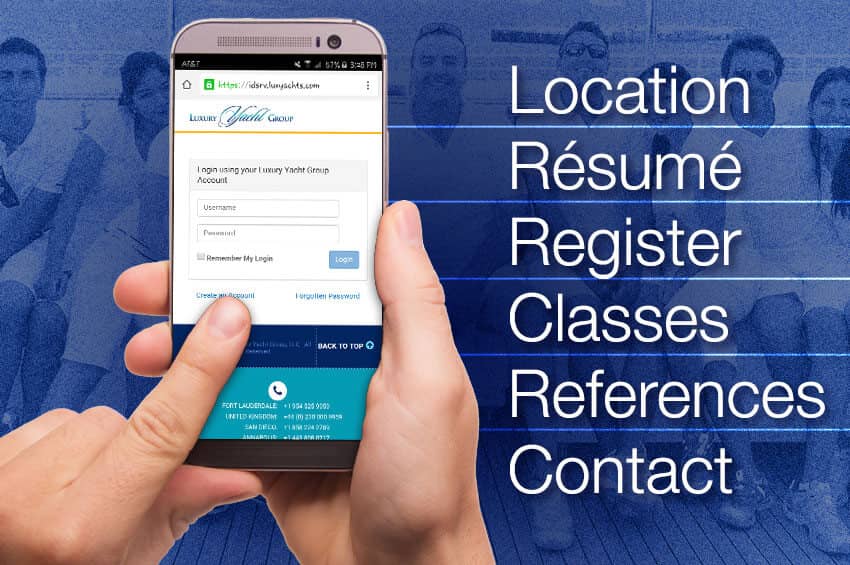
Yachts do hire people with no experience in yachting. The entry-level positions which offer new crew the best opportunity to learn the “ropes” in yachting are: junior deckhand, stewardess, steward, or cook. The key to finding your first position onboard is preparation.
There is a lot of competition for the rookie jobs on yachts. Begin your job search by identifying what skills you have that would be useful on a yacht. Assess your present skills and experience to focus on the characteristics that apply to the job you are targeting. Applicants with professional hospitality experience and training, at a hotel, resort, cruise ship, estate, or restaurant, are at an advantage in entering yachting. Holding specialty skills is also a means to enter the industry, such as masseuse, au pair, fishing guide, engineer, kite surfing instructor, pianist or helicopter pilot. You may just hold the skill that a captain needs to supplement his crew.
In all cases, stepping aboard will require a willingness to work hard and long as part of a team. An interest in learning and being flexible will increase your chances of finding a position that opens a new career path.
To get hired on a yacht with no experience you need to:
- Be in the right place at the right time
Have a professional resume
Register with luxury yacht group.
- Complete basic STCW classes
- Build references with day work
- Maintain contact 24/7
Be in the right place
There are seasons in the yachting industry. You will have the greatest opportunity without experience if you are in the location of highest demand and that changes throughout the season. The European season is May through September, centered in Antibes, France. The Americas/Caribbean generally place out of Fort Lauderdale early winter and early spring. In-person interviews are vital to success in finding a first opportunity. Arrange for flexible accommodations and have adequate living expenses to support yourself through a potential two month job search. Many first time yacht crew receive an immediate offer based on being in the right place at the right time, and could say “yes” on a moment’s notice.
Prepare a CV that portrays you as an energetic team player. Take care with the details. The resume is your best marketing tool. Typos and grammatical errors are red flags for a crew agency. Include a good photo as it is the industry standard. Smile and look the part. Use the Luxury Yacht Group web site for guidance on the basic skill sets for entry level positions. Be diligent in defining experience and highlighting transferable skills. Education, previous job experience, training or knowledge specific to the industry will get your CV a second look. List your most recent experience first. Hobbies and volunteer work can also illustrate character and work ethic. Diving, water sports, fishing, woodworking are hobbies which enhance your fit on a yacht. Provide professional references who have given you permission to use them as a contact. Captains look for an intersection of experience, certifications and personality in making hiring decisions. Give yourself an edge with a bit of personal detail – playing a musical instrument, proficiency in languages, flower arranging – to add dimension to your personality on paper.
Register with Luxury Yacht Group. A large agency with high placement volume offers the most opportunity to identify options for inexperienced crew. Be prepared to interview. Understand the requirements of entry level positions and how to explain the relevance of your experiences. Share stories which illustrate your work ethic, ability to solve problems and work in a team. Be on time and make a professional appearance. Some entry level positions have few specific requirements, but a captain will define specific preferences in a candidate. During an interview offer detail, enthusiasm and discretion when sharing experiences to display your ability to do routine tasks aboard, multi task, and be part of a team. Keep in touch with the agency regularly by logging into the website and confirming interest in any jobs that look good to you. Update your CV as you pick up day work experience, establish local references and complete any coursework you can locally while looking for work.
Complete basic licensing
Basic STCW is a minimum requirement to work on yachts that charter. The course has four parts and takes a week to complete. The modules which make up the Basic STCW certification are: 1) fire prevention and firefighting, 2) personal survival techniques, 3) personal safety and social responsibility, 4) first aid/CPR. Once the certificate is earned, it is valid for five years. Some modules do not expire. Check with your maritime school for details.
Establish references
During the search for a first job aboard, do day work. It is an excellent means to learn your way around a yacht. It is also a way to understand the physical demands and working style of yachts. Day work also provides you with local and yacht specific references. Be flexible on what you are willing to do – cleaning, polishing, detailing, laundry, wash-downs, painting. A seasonal or temporary job – even aboard a delivery without guests aboard – is a first step to a new career in yachting. Captains distinguish between applicants who want to enter a career and those who are looking to fill a summer. Educate yourself on the career path of the entry job so you can convey a commitment to yachting. (Immigration warning…many countries prohibit non-resident tourists from performing temporary “day work” when in their country. For example: a UK citizen admitted to the USA on a tourism ESTA cannot legally seek day work while in the USA.)
Maintain contact
Once a position of interest has been identified you must be available! Answer your phone and respond to emails immediately. Many entry positions are offered to the candidate who is ready to travel. Plans to attend a wedding in a month’s time….drop them. Partying Saturday night with friends….forget it, if the job offer comes in, you jump and get onboard immediately! One of the main reasons yachts pay well is that they expect a very high level of commitment.
Marianne and Gerard are examples of crew hopefuls with no yachting experience. Putting yourself in the shoes of a crew agent or captain, would you consider either of them for a rookie position aboard?
Marianne developed a love of the water fishing with her gramps. He taught her how to trailer his small boat, to steer, anchor and cleat. She described how much fun they had washing down the boat after a day on the lake and spending the winter sanding and painting. While in college she became such a yoga enthusiast that she taught the entire family where she worked, as an au pair, a morning yoga routine.
Marianne has the basics of a junior deckhand. Maintenance is a significant part of the responsibility on deck. She also displays some experience to apply to tender driving. Since she has worked with children, there is an indication that she has the skills to interface with owner families and guests. Her enthusiasm for sharing yoga may be the extra she brings to share with guests. An interview will assess whether Marianne will adapt to the pace and demands of a large vessel and how she will adjust to a team effort.
Gerard was raised in a family who owned a small hotel in a mountain village which served two tourist seasons – winter ski buffs and summer hikers. He explained that he and his siblings pitched in at whatever needed to be done to keep the hotel guests happy and returning each year – serving meals, making beds, loading cars. When he left home to backpack the world, he earned cash along the way by bartending. He has created a favorite cocktail recipe and named it after his hometown.
Gerard lived within the hospitality industry. It appears that his parents instilled a client driven attitude from a young age. As a junior steward, he would be doing many of the same things he did at the hotel as a child. An interview can verify whether Gerard has the “white glove” service standard, understands the need for discretion, and that he would be interested in working within the ‘interior’. Captains will also want to clarify whether Gerard is interested in a yachting career or if he is just adding the experience to his backpacking adventure.
The yachting industry is not a career for everyone. Rookies will find that work on a yacht is demanding, but offers great rewards. Finding a position on a yacht with no experience requires being prepared, having a detailed plan, and maintaining a positive attitude. Follow the steps outlined to increase your chances of coming aboard!

Engineering License Changes
The MCA has restructured the engineering certifications. The MEOL course has been done away with, and the AEC course made mandatory and more thorough. Luxury Yacht Group explains all these changes, what engineers progressing through the ranks can do now, and how Y ticket holders can convert their licenses over to the structure.
14 Mar 2018

A Day in the Life Series – Chief Stewardess
For a yacht to run smoothly, it requires many working parts, and the interior department is a large component of this. The chief stewardess oversees this department and makes sure all the stewardesses onboard know what their tasks and responsibilities are. The interior department is largely in charge of the guest services whilst they are onboard, and responsible for interior maintenance of the yacht when they are not.
18 Dec 2017

A Day in the Life Of Series - Entry Stewardess
Joining the yachting industry is an exciting and daunting undertaking. In this two part interview we speak with Melanie about why she decided to join the superyacht industry, what her hopes and goals are, and what she has learnt so far as an entry level stewardess.
29 Nov 2017
Work On A Yacht
How to become a yacht stewardess: the a-to-z quick start guide.
THE QUICK START GUIDE: THE A TO Z OF HOW TO BECOME A YACHT STEWARD/ESS In the first half of my book, The Insiders' Guide to Becoming a Yacht … [More...]

“The Insiders’ Guide to Becoming a Yacht Stewardess” 2nd Edition – Out Now!
Welcome to the World of the Rich and Famous... Travel, Adventure, and Multi-Million-Dollar Yachts A sea of opportunity awaits you in one of the … [More...]

Yacht Stewardess – A Detailed Job Description (Book Excerpt)
"Julie from The Love Boat Ain't Got Nothin' on a Yacht Stew," an excerpt from Chapter 4: Around the World with a Silver Tray -- What Becoming a Yacht … [More...]

"The Insiders' Guide to Becoming A Yacht Stewardess" Subscribe Now
Read the Preface to “The Insiders’ Guide to Becoming a Yacht Stewardess”
February 20, 2023 By Julie Perry

Following is the Preface to the 2nd edition of The Insiders' Guide to Becoming a Yacht Stewardess: Confessions from My Years Afloat with the Rich and Famous, published in 2006 and updated in 2013... [And if you're ready to begin your yachting … [More]
Superyacht Crew Jobs: Gain Skills for a Bright Future
December 30, 2022 By Julie Perry
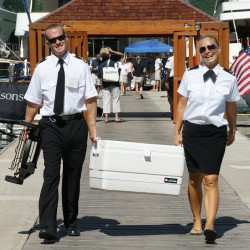
Superyacht Crew Jobs Available NOW Superyacht crew jobs abound right now! Due to the pandemic, there has been a major increase in demand for superyacht crew to fill all positions onboard. This is especially true of the need for American crew to fill … [More]
Working on Cruise Ships vs. Superyachts – A Vast Sea of Difference
October 5, 2022 By Julie Perry

Here's an excerpt from The Insiders' Guide to Becoming a Yacht Stewardess: Confessions from My Years Afloat with the Rich and Famous: I Must Confess… We yachties sort of frowned upon what life might be like aboard the ol’ cruise ships. We were … [More]
July 6, 2022 By Julie Perry

THE QUICK START GUIDE: THE A TO Z OF HOW TO BECOME A YACHT STEWARD/ESS In the first half of my book, The Insiders' Guide to Becoming a Yacht Stewardess, I discuss the yachting industry and give you insight into what this world is all about. I also … [More]
Careers in the Yachting Industry: What Can a Yacht Stewardess Do in the Future?
May 1, 2022 By Julie Perry
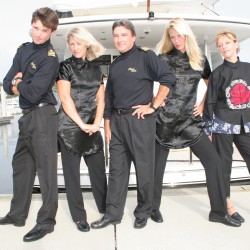
One of the chief questions I hear from people I recruit into the yacht-crew industry is this: "But what will I go do after that?" For some yacht stews, the job represents a long-term career path where they can work up to chief steward/ess status and … [More]
Tales from a Superyacht Stewardess: A Party Debacle on Oscar Night
February 7, 2022 By Julie Perry

A sample "Confession" from The Insiders' Guide to Becoming a Yacht Stewardess: Confessions from My Years Afloat with the Rich and Famous... Julie and her crew tried to go the extra mile by throwing an Oscar viewing party for their billionaire guests, … [More]
About Julie Perry
Our latest tweets, get our email newsletter.
- Name * First Last
- Email This field is for validation purposes and should be left unchanged.

- Career Advice
- Salary Guide
- Dockwalk Presents
- Digital Dockwalk
How to Get a Job as a Deckhand

Kate got her start in the yachting industry working as crew. She spent five years cruising the Bahamas, Caribbean, New England, and Central America, then segued that experience into a career in marine journalism, including stints as editor of Dockwalk and ShowBoats International .
A junior deckhand position is the first step in building a career that can lead to superyacht captain if you’re so inclined. Here is everything you need to know to get a foot on deck...
When you’re looking to break into the tight-knit superyacht industry with a job on deck, come prepared to work hard, take direction, and have a positive outlook.
The best candidates are keen and eager, says Marcy Laturno, executive crew placement director at Luxury Yacht Group in Fort Lauderdale. “All too often now we find entry-level crew come with their own list of demands: where the boat is going, how much time off they will get, what they expect to be paid as a minimum...”
Instead, approach your first superyacht deckhand position willing to learn and grow, and concentrate on completing a season or two on a yacht regardless of its program — private or charter, globe-trotting or more sedentary — and you’ll be on your way to your pick of positions.
What is a Deckhand?
A deckhand is responsible for cleaning and maintaining the exterior of the vessel. Led by the bosun, the deck team also assists in docking operations, launches and stows the tenders and toys , drives the tender, supervises guests’ watersports activities, and pitches in to help the interior crew after their duties are finished for the night.
Will Hollingshead, a first officer who has been hiring deckhands since his days as bosun and lead deckhand, says it’s important to have the ability to keep yourself motivated and working hard. “If I walk on deck and catch a dayworker or deckhand sneaking their phone back into their pocket or leaning back then I’ll let it slide, but if it’s multiple times a day then I’ll lose trust in that person.”
What Does a Deckhand do?
“Be prepared to clean, polish, clean, and polish some more,” says Erica Lay, director of placement agency El Crew Co in Palma de Mallorca.
How close it is to the start of a season will determine the type of work that needs to be done, says Hollingshead. “Mid winter in the Med, then you’re looking at opening up bigger projects; closer to the start of the summer it will be more teak scrubbing, stainless polishing and beautifying the yacht.”
When guests are not on board, “you will be doing the dirty work, especially if you’re junior,” says Madison Bailes, who has worked on deck of yachts spanning 116 to 350 feet. “You’re going to be cleaning the things that can’t be cleaned when the boss is on board: soaking/scrubbing cushion covers, ‘Flitz’-ing stainless, maybe detailing the engine room, paintwork, or if you’re really lucky, hanging out in a bilge,” she says with a smile. She describes this time as “chill” though — a regular eight-hour workday with a lunch break and maybe even a dock beer at the end of the day.
- Top 10 Deck Hacks for Crew
When the owner or charter guests are on board, it is a much longer and higher-pressure day. “The usual is a 13-hour workday, a three-hour break at one point and a longer eight-hour break for your main rest, though this differs from yacht to yacht,” Hollingshead says.
There is no such thing as a typical day with the boss on, Bailes says. “You could literally be in the water all day launching Jet Skis, tenders, paddleboards, doing fly-boarding and snorkeling, or you could be stood at the top of a gangway for hours watching the boss’s McLarens. I’ve done both and it all differs depending on your boat and your program.”
There will be a wider range of duties on smaller boats with fewer deckhands. On the largest superyachts, those in the junior positions may find themselves discreetly cleaning all day, while staying out of the guests’ way.
Who Does a Deckhand Report to?
On smaller yachts, a deckhand would report to the mate or directly to the captain. On larger vessels the bosun or lead deckhand is in charge of the deck team.
“The best people to work for are the ones who have the time and inclination to reach and train their junior deck crew, helping them learn how to paint, varnish, repair the yacht, etc.,” says Hollingshead.
What Qualifications do I Need to Become a Deckhand?
The prerequisites for any crew position are STCW Basic Safety Training and an ENG1 medical certificate. In addition, there are several qualifications that entry-level deckhand candidates can consider.
First of all, an RYA Powerboat Level 2 (PBL2) is what Lay calls “imperative” for working in the Med as it allows a crewmember to drive a tender in countries that require a certificate to operate small craft under 10 meters — which is most of Europe. International Yacht Training also has a course that satisfies this requirement called IYT Small Powerboat and RIB Master, which is MCA recognized.
Large motor yachts may require an MCA STCW95 certificate in Proficiency in Designated Security Duties, or PDSD for short. The one-day course is necessary for anyone with security duties on ISPS-compliant yachts, which are greater than 500 gross tons (roughly 55 meters and up).
- Everything You Need to Know About STCW Training
“Those (qualifications) are for starting out. Once a deckhand has a season or two or more under their belt and knows this is a career for them, I’d recommend they do Yachtmaster Offshore and consider looking into their EDH (MCA Efficient Deckhand), which must be held 18 months before going for OOW (Officer of the Watch),” says Lay.
In addition, Hollingshead adds, “Having a PWC license or even a PWC Instructor license is always a good short course to set yourself apart from the rest.” The RYA PWC license is a one-day course. It’s a prerequisite for the Instructor course, as is two years’ experience riding personal watercraft, which allows the crewmember to run the “RYA Introduction to PW Safety course” for guests on superyachts.
What Experience do I Need?
“Most jobs for junior crew I receive usually start with ‘must have at least a season’s experience,’ which is frustrating for the new crew to hear but sometimes we can get around that by demonstrating how transferrable their skills are from other industries or recreational activities,” Lay says.
Laturno also uses the term “transferrable” and gives some examples: “recreational boating backgrounds, skilled labor backgrounds, watersports experience, tender driving skills, to name a few.”
One way to break into crew work is by getting real-world experience in the maritime world, adds Hollingshead. “Go and get a job in a marina, work for a boat-building company, learn about teak, painting, epoxy, etc.
- 10 Tips for Newbie Deckhands
“There are two main work/life experiences that I value in a candidate,” he continues. “The first is any construction or building site experience. I grew up working on building sites with my dad and it teaches you about hard work, fixing things with the tools you have on hand, and also that most problems are solvable with a bit of forethought and working as a team. The second is anyone who has worked as a watersports instructor. I spent seven years as a windsurf/sailing instructor in Greece and Turkey before getting a job as a deckhand. When you’re hiring someone with that experience, you know they can drive a tender and that they’re comfortable on and in the water with your guests and their children.”
Bailes, who started her maritime career as a dive instructor, adds that any trade where you have acquired people skills correlates well in yachting, as does work involving cleaning, mechanics, and outdoor activities.
- How Dayworking Can Help Yacht Crew Break Into the Industry
How Much Does a Deckhand Earn?
“Starting pay for a junior deckhand in the Med is €2,500 (per month), with possibly more for skilled newbies, i.e. watersports instructors, so €3,000,” says Lay. Laturno at Luxury Yacht Group sees monthly salaries averaging $2,750 to $3,000 with the same amounts in euros.
For the ultimate answer, we turn to the Dockwalk Salary Guide , for which a dozen crew agencies around the world shared the salaries of the deckhands they placed. The numbers increase as the boat size does, and the range given for each size vessel spans various experience levels, so those just entering the industry should pay attention to the lower number. These start at $2,500 per month for boats under 80 feet, go up to $4,500 for yachts under 200 feet, and finally, $4,500 for yachts 200 feet and up.
While this may not sound like big bucks, keep in mind that a crewmember’s living expenses are close to zero so nearly all of your salary can be saved. In addition, charter yachts can offer some pretty lucrative tips on top of salaries.
P.S. A Side Note for Women
Yacht deckhand jobs have historically been dominated by men, but today more women than ever are starting their yachting careers on deck rather than inside, and gender should never be an obstacle.
Bailes, who joined the industry with a Yachtmaster license from her days on dive boats, still encountered yachts that wanted to make her a stewardess. “They see long hair and a pretty face and, boom, they want you in a skort cleaning cabins.
“While being a stew is an excellent career, if you want to be on deck, stand your ground and turn the job down if you have to,” she advises. “Do your Powerboat Level 2, not silver service, go for as many courses as you can and daywork as much as possible to gain experience. I know for a fact that I beat most guys to a job because my resume is stacked!”
More Career Guides:
- How to Get a Job as a Superyacht Captain
- Everything You Need to Become a Yacht Stewardess
- How to Land a Job as a Yacht Chef
- The Dos (and Don’ts) of Your First Crew Interview
More from Dockwalk
Most popular on dockwalk.

Start working as crew on Superyachts
Start online to become a stewardess or deckhand on yachts in only 6 weeks and fully stcw-certified..

Become yacht crew in a few weeks , not months...
How to start today , get fully stcw certified and a yacht job in 6 weeks with flexible online training , superyacht training online course.

Get your free personal yacht plan and checklist
24/7 support to get your first yacht job.

Ready to become yacht crew and start ?
Select your position to become a yacht stewardess and yacht deckhand today., we have helped hundreds of yacht crew on board, read what our customers and crew say about us......
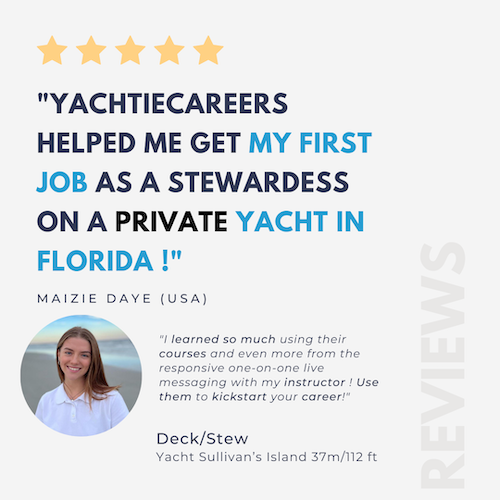
(5.0) Rating on Google Reviews
Book the full STCW Training week in the Mediterranean.

Deckhand Superyacht STCW Training
All you need to become a successful deckhand and get your first yacht job.
Yes, I want to start now and become Yacht crew

Stewardess Superyacht STCW Training
Where can i start working on yachts .
With Yachtie careers you can start online yacht crew training anywhere in the world, and then we custom make your package offering you hybrid online training with Basic Safety in your home country or booking the STCW with us in Split, Croatia.
Can I do Yacht Training online to start ?
Yes, it is the perfect way to start Yachting. We have specifically made this package for brand new crew looking to start, so that you can start without paying a huge training fee and still get the tools needed.
At the end of the training, you will get:
- Superyacht Introduction Online Certificate
- A custom plan on getting all your certificates that you are going to require for your position and location and get started with your instructor.
Can I work on board with the certificates I get ?
Yes! We have tailor made the packages so you get exactly what you need to be qualified to work on a Yacht. You also get the training and tools to work as a Stewardess and Deckhand on board a Yacht.
STCW Basic Safety Certificates
STCW Security Awareness Certificate
STCW PDSD Certificate
Food& Hygiene Level 2 CPA Certificate
Deckhand Course Certificate
Stewardess Course Certificate
This is IMO and MCA recognised and enables you to work on any Superyacht in the world.
You will also get a Superyacht Security Awareness Certificate and a CPD approved Food and Hygiene Level 2 Certificate and a Superyacht Course Certificate after completing our Yacht crew training package.
We will put it all on your CV when writing it for you.
What qualification do I need to work on a Yacht ?
To start with us you simply need a laptop to sign up and do the online yacht crew training course and your profile in the Online Superyacht Introduction package.
To work on board and get a yacht job, you need the following that you can book in our yacht crew training:
- Stewardess Training
- Deckhand Training
- ENG1 Medical Certificate
- Food and Hygiene Level 2
- STCW Security Certificates
- Superyacht CV to apply for jobs.
- STCW Training Certificates and Basic Safety
How much is a yacht stewardess/deckhand salary ?
A Yacht stewardess salary starts from 2300€ and with experience and the right yacht crew training and qualifications, yacht crew can earn up to 10000€.
A Junior Deckhand salary starts from 2300€ and with experience and the right yacht crew training and qualifications, yacht crew working on deck can make up to 10000€.
Should I do Yacht STCW Online or STCW Basic Safety ?
Both include mandatory certificates you need as qualified Yacht crew such as:
STCW Security courses and Food & Hygiene.
STCW Full also include Basic Safety training – 7 days training and accommodation with us in Croatia.
STCW Online yacht crew training you get everything that you get in STCW full – But the Basic Safety Training we will organise at your preferred location for you instead. This option is for you that want to book the Basic Safety in your hometown. Of course we will assist you with the booking and arrangements.
Do I get a job after the Yacht Crew Training ?
We write your CV, plan your job search and connect you to yachts and agencies in our network, so that you together with the other crew in our network together can get jobs faster.
How long does it take to get a Yacht job ?
This is completely up to you and how hard you are willing to work with during and after your yacht crew training with us to make it happen. We have a 10-step plan to get you on board within 40 days of signing up.
We have created Yachtie careers not only to get certified but to get your first superyacht job faster. That is why we have made the yacht crew training packages. You do not only get the certification, but we give you the CV, tools and guidance to maximise your chances acing your interviews and increase your superyacht job offers.
Does Yachtie careers help with finding a yacht job ?
We tailor make the training and certificates based on your position, location and preference to get all you need to be qualified to work and get a superyacht job.
In addition to this we give you the training and the tools with a Superyacht CV so that you can get job offers after the training!
What happens when I book yacht crew training ?
- You receive a full details for your yacht crew training
- You receive log in details and create a members profile with us for your yacht crew training
- We enroll you in the STCW training to become qualified to work on Yachts
- We organize your ENG1 and Medical certificate
- We write you a Superyacht CV to find your first Superyacht job
- You connect with your instructor and follow the 10-step plan on how to become yacht crew and find your first superyacht job.
Book your Superyacht training
Select your location in croatia or florida and become yacht crew online., follow the life of yachtiecareers crew.
- Partnerships
- Privacy Policy
- Terms & Conditions
- + 46 735895888
- [email protected]
Start on Yachts

Next 2 bookings get 50€ free when applying code: yachtie50
Get free yacht cv and yacht job offers
What Really Happens at a Sex Party? 8 Women Share Their True Stories
By Varuna Srinivasan

Welcome to Doing It , a column where sex educator Varuna Srinivasan explores the deep connections between sex and emotions. This month, we examine the art of the sex party — and what these infamous fêtes really entail.
Sex parties are exactly just that. They are parties, like any social gathering, except the people attending can (oftentimes) have sex. At some point in our lives, most of us have attempted to make out — or even get downright dirty — in the bathroom of a public venue, be it a nightclub, bar, or even an old-fashioned house party. (Plus, let’s be honest, many such locations are not safe places for women or queer folks .) Dancing and flirting are great, but if you’re looking to do more, know this: There are countless curated spaces that don’t just permit but encourage such mingling.
However, sex parties are not a monolith; they differ immensely from place to place, so I want you to forget what you’ve seen in the movies. While all such parties encourage sexual activity to some degree, it’s essential to have a clear understanding of what the party will entail — and to ensure that your own intentions, interests, and expectations align — prior to engaging in any activities (or even RSVPing). There are many differences between, say, a swingers orgy hosted at a person’s house versus a play party in a full-time dungeon, and both are quite unlike a warehouse party with beds in the back. My point: While your experience may vary for a number of reasons, the venue itself plays a big role.
Some parties encourage full-on orgies . Some are play parties that focus more on kink and not so much on penetration or heavy sexual activity. But all these events prioritize sex positivity, particularly play parties, also known as kink/BDSM parties.
“Play parties are often diverse and offer a protected outlet to explore diverse desires, specifically in groups beyond couple exchange,” explains Venus Cuffs , a nightlife entrepreneur and play party producer. “Swingers parties are typically, but not always, for couples in the swinger Lifestyle — with a capital L — meaning they like to play as a couple, often to varying degrees. But [they] will arrive and leave the party together and partake in couple-on-couple swaps.”
Cuffs says that people outside the BDSM community are often surprised to learn that most fetish or kink parties actually limit penetration, oral play, and, in some cases, even heavy petting.
What are some tips for a first-time sex party attendee?
It can feel daunting to go to a party where any type of sexual activity is encouraged. To ensure that you have a good time, below are three hot tip recommendations, straight from Venus Cuffs herself.
- Trust the source. Research the promote or group throwing and the party and make sure they prioritize consent and acceptance.
- Safety first. Make sure the people throwing the party have enforceable no-tolerance and policies and consent monitors.
- Communicate. Whether you’re going with a partner or alone, take time to mindfully think through desires, expectations and concerns. Check in with yourself often and prioritize your needs.
So, what are sex parties actually like?
Every experience is different, of course, so I spoke to eight women about their first time attending an event in one of these spaces. Curious to try out a sex party? Maybe you already RSVP’d and are now digging for details to figure out what you should expect. Either way, let their experiences give you a sneak preview on what it might involve.
“When I was 18, I joined a swingers website. I started dating a couple who frequented swinger parties. My first experience was exciting because I went with [them], so we got a lot of attention because we were young, attractive, and all exhibitionists. It got me really into the sensual experience and meeting people who enjoyed it, as well.
“Now, I frequently attend parties, but instead of swinger parties, I tend to find more queer-oriented parties and kink-focused events. A typical event will have a space where people can chat (and not play) and get to know each other, as well as other various stations set up for different scenes to have fun. Consent and rules of engagement are typically involved in good spaces.
“Find a play partner who you can bring to explore with. It's a lot easier when you have a friend to lean on for support. Also, nonsexual munches can be a great place to start and get to know people. Don't be afraid to say no and set boundaries. It's not free for all. If something or someone makes you uncomfortable, let someone know. “
“I had previously attended a few fetish parties in Scotland called Torture Gardens. However, my first sex party was in November 2022.

By Kara Nesvig

By Sophie Saint Thomas

“There was a lot of latex, leather, and lace involved. At around 9 p.m., we proceeded to the dungeon which was across the street from my friend's home. The dungeon was divided into three parts: one had a couch, a wall of dildos, a standing cage, hoists, a spanking bench, and a big bed-like table. The second area featured a [penetrative machine] and a St. Andrew's Cross , along with a bench and multiple impact play toys, ranging from riding crops to floggers made with rubber spikes. The third room was for those who wanted to indulge in [ medical fetishism ]. That room was stocked with equipment needed for sounding, milking, pumping, nitrous gas, speculums, and a [gynecologist] chair with provisions to have multiple restraints.
“It was definitely one of the more enlightening experiences of my life. The amount of aftercare each of us offered [one another] was extraordinary. Snuggles being shared across the rooms, people laughing, people moaning, people crying. Oh yes — crying. I cried. I cried a lot.”
“I discovered the swinging lifestyle after separating from my first husband in 2016. I met someone on Tinder who introduced me to sex clubs, parties, and the lifestyle. My first party was at a sex club in New York City called Checkmate.
“It was a regular-looking apartment building. We took the elevator downstairs, paid the fee, and were welcomed into a bar area. Once ready to play, we went to a locker area where we could take our clothes off and get ‘comfortable.’ We made it to the play areas: a group play room, a semi-private playroom, and the private play rooms. We observed and decided to start the party by playing together. Soon after, we were invited by other couples to join them and engaged in swapping situations. It was hot, a positive experience for sure. The rest is history.”
“My first experience was a prepandemic party in a private loft. This was a performance-based event where the performers sometimes engaged in sex on stage. I saw Vonka and Lydia of the Bluenettes perform a milk-soaked kitten-[themed] act, which was the wildest, hottest thing I had ever seen in porn or real life. I was in the front row, just a couple of feet from two beautiful writhing bodies engaged in sapphic love and pleasure.
"Since then, I’ve been to several different kinds of parties. There are no typical parties, as they all differ depending on who is throwing them. I only frequent parties [organized] by those who prioritize the safety of everyone involved, [which means] having clear consent standards, agreements, and boundaries and [hiring] guardians for attendees to reach out to as a way to reduce harm. Those are the parties that I often recommend.”
“First, to clarify, I am not a member of the swing lifestyle. I am a member of the kink community and a BDSM practitioner. I have never had group sex , nor do I attend swing parties or share partners. I go to BDSM and kink-friendly parties, many of which are sex-positive. I am monogamous when dating and, although I engage in play at parties, it is not always inherently sexual.
“The first event I went to was a BDSM party for 18- to 35-year-olds. There were strict rules: no nudity and no penetrative play. I was really nervous, and my friend left me early on to go play with a friend of theirs, so I mostly spent the night talking to people and getting to know how a party works. There were dungeon monitors to make sure the scenes and people were safe, [as well as] toys you could borrow, a spanking bench, St. Andrew's cross, several hard points for suspension, and a massage table. I ended up meeting a guy who had never been to a party either and we fooled around a bit in a kind of vanilla way. “
“My first time was at the Hacienda in Brooklyn. Hacienda is a house, so it's a very social space —- at least, that has been my experience since I go to smaller parties where there is food prepared by a chef, an outdoor space where people talk, and play areas.
“Even though I knew the etiquette and theory — Playing Well With Others was a big help — I was a bit nervous. People told me I was a natural, but I think that's just because I was very mindful, communicative, and open to new experiences. I had sex with three people separately, [each] on a one-on-one basis and not as a group, and met a ton of sex-positive individuals. It felt like I finally found my people.
“Everyone is nice to each other, everyone takes consent very seriously. I feel extremely safe there. There's people that don't play with anyone and just socialize and there's others having seven-person orgies. You'll find whatever you want there."
“My first experience was very positive. I went with someone who was very experienced in the kink and swinging community. It was a bit of a shock to see people engaging in various sexual acts all in the open — not in a negative way, [I simply hadn’t] been in that environment before.
“[The party featured] good music, lots of sexy people, and really hot scenes — so hot that I stepped out of my comfort zone to openly masturbate in a less-crowded area, [where a woman then] asked to join me. She also asked me if her husband could watch. I was surprisingly okay with it, considering I’m not really into men.”
“I’ve never been to a sex party, but I have been to a number of sex clubs. The first one I ever went to was KitKat in Berlin. I honestly wasn’t shocked by anything happening around me, it was a pretty free and accepting environment. All clubs work differently, but usually they will take your phone or give you a locker [for it] and potentially a place to get towels and things for safe sex. People can be having sex all around you and generally will only engage if you give clear consent.
“I’ve been to a few other clubs of this nature around the world and they have similar vibes. Some are more exclusive than others, some are more queer-focused, but the ethos around it [all] is positivity and enjoyment.”
*Interviews have been edited for length and clarity. Some names have been changed at the request of sources.

Allure Daily Beauty Blast
By signing up you agree to our User Agreement (including the class action waiver and arbitration provisions ), our Privacy Policy & Cookie Statement and to receive marketing and account-related emails from Allure. You can unsubscribe at any time. This site is protected by reCAPTCHA and the Google Privacy Policy and Terms of Service apply.

By Jennifer Hussein

- Log in/Log out (Opens in new window)
- All content
- Rural Alaska
- Crime & Courts
- Alaska Legislature
- ADN Politics Podcast
- National Opinions
- Letters to the Editor
- Nation/World
- Film and TV
- Outdoors/Adventure
- High School Sports
- UAA Athletics
- National Sports
- Food and Drink
- Visual Stories
- Alaska Journal of Commerce (Opens in new window)
- The Arctic Sounder
- The Bristol Bay Times
- Legal Notices (Opens in new window)
- Peak 2 Peak Events (Opens in new window)
- Educator of the Year (Opens in new window)
- Celebrating Nurses (Opens in new window)
- Top 40 Under 40 (Opens in new window)
- Alaska Spelling Bee (Opens in new window)
- Alaska Craft Brew Festival
- Best of Alaska
- Spring Career Fair (Opens in new window)
- Achievement in Business
- Youth Summit Awards
- Three Barons Renaissance Fair Giveaway
- Sully's Rising Fest Giveaway
- Teacher of the Month
- 2024 Alaska Summer Camps Guide (Opens in new window)
- 2024 Graduation (Opens in new window)
- Alaska Visitors Guide 2024 (Opens in new window)
- 2023 Best of Alaska (Opens in new window)
- Alaska Health Care (Opens in new window)
- Merry Merchant Munch (Opens in new window)
- On the Move AK (Opens in new window)
- Senior Living in Alaska (Opens in new window)
- Youth Summit Awards (Opens in new window)
- Alaska Visitors Guide
- ADN Store (Opens in new window)
- Classifieds (Opens in new window)
- Jobs (Opens in new window)
- Place an Ad (Opens in new window)
- Customer Service
- Sponsored Content
Trump delivers rambling, falsehood-filled response to guilty verdict
Former President Donald Trump speaks during a news conference at Trump Tower, Friday, May 31, 2024, in New York. A day after a New York jury found Donald Trump guilty of 34 felony charges, the presumptive Republican presidential nominee addressed the conviction and likely attempt to cast his campaign in a new light. (AP Photo/Julia Nikhinson)
NEW YORK — Donald Trump sought to move past his historic criminal conviction on Friday and build momentum for his bid to return to the White House with fierce attacks on the judge who oversaw the case, the prosecution’s star witness and the criminal justice system as a whole.
Speaking from his namesake tower in Manhattan in a symbolic return to the campaign trail, the presumptive Republican presidential nominee delivered a message aimed squarely at his most loyal supporters. Defiant as ever, he insisted without evidence that the verdict was “rigged” and driven by politics.
“We’re going to fight,” Trump said from the atrium of Trump Tower, where he had descended his golden escalator to announce his 2016 campaign nine years ago next month. It was that campaign that led to the charges that made Trump the first former president and presumptive major party nominee in the nation’s history to be convicted of a crime.
While the guilty verdict has energized Trump’s base, fueling millions of dollars in new campaign contributions, it’s unclear how the conviction and his rambling response will resonate with the kinds of voters who are likely to decide what is expected to be an extremely close November election. They include suburban women, independents, and voters turned off by both candidates who remain on the fence.
Trump cast himself as a martyr, suggesting that if this could happen to him, “They can do this to anyone.”
“I’m willing to do whatever I have to do to save our country and save our Constitution. I don’t mind,” he said, as he traded the aging lower Manhattan courthouse where he had spent much of the last two months for a backdrop of American flags, rose marble and brass.
“It’s a very unpleasant thing, to be honest,” he added. “But it’s a great, great honor.”
President Joe Biden, responding to the verdict at the White House, said the former president “was given every opportunity to defend himself” and blasted his rhetoric.
“It’s reckless, it’s dangerous, it’s irresponsible for anyone to say this is rigged just because they don’t like the verdict,” Biden said.
[ Alaska Republicans back Trump after historic conviction ]
No former president or presumptive party nominee has ever faced a felony conviction or the prospect of prison time. But Trump has made his legal woes the centerpiece of his campaign message as he has argued without evidence that the four indictments against him were orchestrated by Biden to hobble his campaign. The hush money case was filed by local prosecutors in Manhattan who don’t work for the Justice Department or any White House office.
A Manhattan jury on Thursday found Trump guilty of 34 charges in a scheme to illegally influence the 2016 election through a hush money payment to a porn actor who said the two had sex.
Despite the historic ruling, a convicted Trump sounded much the same as a pre-convicted Trump, as he delivered what amounted to a truncated version of his usual rally speech.
The Republican ex-president, as defiant as ever, argued the verdict was illegitimate and driven by politics and sought to downplay the facts underlying the case.
“It’s not hush money. It’s a nondisclosure agreement. Totally legal, totally common,” he said.
When Trump emerged from the courtroom immediately after the verdict Thursday, he had appeared tense and deeply angry, his words pointed and clipped. But by Friday, he seemed more relaxed — if a little congested — especially as his remarks evolved into a version of his usual rally speeches, complete with acted-out stories and exaggerated hand gestures. He did not take questions from reporters, marching off as supporters who had been assembled in the lobby cheered.
Trump, who has painted himself as pro-law enforcement and even talked of how officers might handle suspects roughly, has spent the last two years attacking parts of the criminal justice system as it applies to him and raising questions about the honesty and motives of agents and prosecutors.
In his disjointed remarks, Trump attacked Biden on immigration and tax policies before pivoting to his case, growling that he was threatened with jail time if he violated a gag order. He cast intricate parts of the case and trial proceedings as unfair, making false statements and misrepresentations as he went.
Trump said he had wanted to testify in his trial, a right that he opted not to exercise. Doing so would have allowed prosecutors to cross-examine him. The former president on Friday raised the specter of being charged with perjury for a verbal misstep, saying, “The theory is you never testify because as soon as you testify — anybody, if it were George Washington — don’t testify because they’ll get you on something that you said slightly wrong.”
[ Here’s what Trump’s conviction in hush money trial might mean for the election and what could happen next ]
Testing the limits of the gag order that continues to prohibit him from publicly critiquing witnesses including Michael Cohen, Trump called his former fixer, the star prosecution witness in the case, “a sleazebag,” without referencing him by name.
He also blasted the judge in the case, saying his side’s chief witness had been “literally crucified by this man who looks like an angel, but he’s really a devil.”
He also circled back to some of the same authoritarian themes he has repeatedly focused on in speeches and rallies, painting the U.S. under Biden as a “corrupt” and “fascist” nation.
His son Eric Trump and daughter-in-law, Lara Trump, joined him, but his wife, Melania Trump, who has been publicly silent since the verdict, was not seen.
Outside, on Manhattan’s Fifth Avenue, supporters gathered across the street flew a giant red “TRUMP OR DEATH” sign that flapped in front of a high-end boutique. A small group of protesters held up signs that said “Guilty” and “Justice matters.”
On Friday morning, Trump’s campaign announced it had raised $34.8 million from the time the verdict was announced through midnight. That’s more than $1 million for each felony charge and more than his political operation raised in January and February combined. Just under 30 percent of that money came from donors who had not previously given to the campaign through the online platform, they said.
Trump and his campaign had been preparing for a guilty verdict for days, even as they held out hope for a hung jury. On Tuesday, Trump railed that not even Mother Teresa, the nun and saint, could beat the charges, which he repeatedly labeled as “rigged.”
His top aides on Wednesday released a memo in which they insisted a verdict would have no impact on the election, whether Trump was convicted or acquitted.
The news nonetheless landed with a jolt. Trump listened as the jury delivered a guilty verdict on every count. Trump sat stone-faced while the verdict was read.
His campaign fired off a flurry of fundraising appeals, and GOP allies rallied to his side. One text message called him a “political prisoner,” even though he hasn’t yet found out if he will be sentenced to prison. The campaign also began selling black “Make America Great Again” caps, instead of the usual red, to reflect a “dark day in history.”
Aides reported an immediate rush of contributions so intense that WinRed, the platform the campaign uses for fundraising, crashed. The $34.8 million raised Thursday did not include what Trump collected at his in-person fundraiser or any donations that continued to come in online Friday.
Trump is set in the upcoming two months to have his first debate with Biden, announce a running mate and formally accept his party’s nomination at the Republican National Convention. But before he goes to Milwaukee for the RNC, Trump will have to return to court on July 11 for sentencing. He could face penalties ranging from a fine or probation up to four years in prison.
Associated Press writers Adriana Gomez Licon in Miami, Meg Kinnard in Columbia, South Carolina, Gary Fields in Washington and Ali Swenson and Michael R. Sisak in New York contributed to this report.

IMAGES
VIDEO
COMMENTS
The tips depend on the size of the Yacht and the guests, but a good estimate is 10 - 20% of the total weekly price of a Yacht. If you imagine a 50m (165 foot) Yacht with 9 crew, it typically charters for $150,000 - $250,000 per week. For simplicity, let's add a 15% tip for $200,000/wk.
Inexperienced yacht crew working as deckhands or stewardesses can earn between $2000-3000 a month. With more experience and higher positions, your salary can be between $3500-$6000 a month. On charter trips, guests typically tip 5% - 15% of the weekly charter fee, which is split between crew members.
Courses that introduce entry-level candidates to yacht interior work are offered in many countries around the world. "Bluewater hosts some fantastic courses; their Yacht Interior Service courses start at a zero-to-hero course and can really help with a newbie or green stewardess who wants to acclimate and understand the principles and products used on a vessel," Bamforth says.
Dock walking is a good way of getting a job, mainly on small yachts. The usual way to obtain crew work is literally to walk the docks and marinas, visit crew agencies and even frequent pubs/cafés used by existing crew. It is important to dress appropriately, as you are selling yourself. Make sure that you 'look the part' as first impressions ...
Working On Yachts. Explore New Horizons. There are currently over 15,000 yachts in the world large enough to require professional, qualified yacht crew and as a result this industry is growing rapidly each year. A career in yachting can be rewarding, exciting and a wonderful opportunity to travel the world and explore new horizons! ...
Much of a deckhand's work is performed on the outside of the boat. Therefore, as a deckhand, you would be doing a lot of manual labor outside. This can be helpful to keep in mind when deciding if working as a deckhand is right for you. Deckhands usually make between $27,000 and $55,000 per year. 3.
Boatsetter is a unique boat-sharing platform that gives everyone — whether you own a boat or you're just renting — the chance to experience life on the water. You can list a boat, book a boat, or make money as a captain. Put your boat to work— Start earning an avg. of $20K yearly with Boatsetter. Diane Byrne.
Start Working on a Superyacht by Completing the Following Steps: Have realistic expectations. Select a superyacht job department. Complete superyacht training courses. Obtain an ENG1 medical certificate. Select a location to join the industry. Obtain visas & documentation.
This includes being punctual, maintaining a positive attitude, and taking pride in your work. As you continue to excel in your role and gain the trust of your captain and fellow crew members, you will be well on your way to climbing the yachtie career ladder and achieving your ultimate goal of becoming a captain. 6.
Step 5: Network within the Yachting Community. Networking plays a vital role in securing a job on a yacht. Attend industry events, join online forums and social media groups dedicated to yachting, and connect with experienced yachties and crew agencies. Networking can open doors to job opportunities and valuable connections within the yachting ...
The money you make will also depend on the owner of the yacht and where they are based in the world, the itinerary of the yacht, and whether it's private or charter. On average, this is what you can expect to earn monthly doing various yacht crew jobs: Deckhand Jobs: $2700. Steward: $3000. Chef: $4000.
Go to a superyacht marina. 1. Have the right attitude. Along with gaining the correct qualifications to prove your competence, to become a Yachtie, you must have certain characteristics to thrive in this industry. Yachties have to be well presented, articulate, know how to take orders, and be able to work hard, all with a smile and enthusiasm.
Yacht interviews will usually be held face to face if nearby the vessel or more commonly, by telephone or video call. We recommend: • Be on time. • Impeccable presentation. • Be prepared, try to do some research, where available. • Show commitment to the boat. • Ensure you get across ALL relevant experience for the role that you are ...
3) Daywork: Sometimes daywork can lead to long term opportunities. While daywork is temporary, crew may not realize that daywork can lead to the Captain or department head interviewing you and seeing how you might fit in with a boat full time. 4) Checking in: Check in with your agents. The better your crew agent knows you, the easier it is for ...
Getting started as a green yacht crew member may seem like a daunting task. You've seen all the exciting videos of yacht crew living and working on board the...
Once you are qualified, follow these steps: Construct a CV. Be sure to include all relevant information and documents, as well as a friendly, yet professional photo of yourself. Download our free template for a starting point. Pick a location to start. Antibes in France, Palma de Mallorca in Spain, and Fort Lauderdale in Florida are great ...
It could be as simple as talking to someone in line at the grocery store. Or letting someone cut in front of you at a crowded bar that helps land you your first job. 7. APPLY, APPLY, APPLY. You are not going to get a job on a Superyacht unless you keep applying and sending out your CV.
To Work on a Yacht Without Experience - Make a Plan. Yachts do hire people with no experience in yachting. The entry-level positions which offer new crew the best opportunity to learn the "ropes" in yachting are: junior deckhand, stewardess, steward, or cook. The key to finding your first position onboard is preparation.
If possible, go ahead and schedule your personal interview. (Chapters 9 and 10) Book that airplane ticket, and move to a hiring port. (Chapter 8) Once you are physically in a hiring port, go meet with the agencies. I recommend registering with a minimum of two crew recruitment agencies to get started.
Read the Preface to "The Insiders' Guide to Becoming a Yacht Stewardess". February 20, 2023 By Julie Perry. Following is the Preface to the 2nd edition of The Insiders' Guide to Becoming a Yacht Stewardess: Confessions from My Years Afloat with the Rich and Famous, published in 2006 and updated in 2013... [And if you're ready to begin ...
We can kick-start your career, giving you a basic package for only €12, this is giving you an Introduction, E-book and a 100€ award to spend on kick-starting your career, without making a big commitment. ... Yacht CV and yacht qualifications you need to become a stewardess or deckhand to work as yacht crew on board. ...
One way to break into crew work is by getting real-world experience in the maritime world, adds Hollingshead. "Go and get a job in a marina, work for a boat-building company, learn about teak, painting, epoxy, etc. 10 Tips for Newbie Deckhands. "There are two main work/life experiences that I value in a candidate," he continues.
To start with us you simply need a laptop to sign up and do the online yacht crew training course and your profile in the Online Superyacht Introduction package. To work on board and get a yacht job, you need the following that you can book in our yacht crew training: Stewardess Training; Deckhand Training; ENG1 Medical Certificate
Make sure the people throwing the party have enforceable no-tolerance and policies and consent monitors. Communicate. Whether you're going with a partner or alone, take time to mindfully think ...
Trump and his campaign had been preparing for a guilty verdict for days, even as they held out hope for a hung jury. On Tuesday, Trump railed that not even Mother Teresa, the nun and saint, could ...